>Epstein sex abuse victims tell court it's time for Acosta to explain his actions
>Secretary of Labor Alexander Acosta, already under federal investigation for a secret immunity deal he gave to a suspected sex trafficker of underage girls, may have to face some of those victims — who are now adult women — in a federal courtroom.
>In a new court filing, two victims, molested as teenagers a decade ago, are asking a federal judge to hold a hearing for all the women who were sexually abused by Jeffrey Epstein, a multimillionaire financier who received a non-prosecution agreement from Acosta when Acosta was a federal prosecutor in Miami in 2007.
>The controversial agreement negotiated by Acosta allowed Epstein to escape federal sex trafficking charges, even though evidence showed that Epstein had molested more than three dozen girls at his Palm Beach mansion in the 1990s and early 2000s. The victims were never told about the deal, which Acosta then sealed — thereby making it impossible for anyone, including his victims, to find out what crimes Epstein had committed and whether there were any other victims or accomplices involved.
>In February, U.S. District Court Judge Kenneth A. Marra declared that the non-prosecution agreement was illegal because it violated the Crime Victims’ Rights Act, designed by Congress to prevent crime victims from being ignored in the criminal justice process. In this case, the judge ruled, federal prosecutors deliberately hid the agreement from Epstein’s victims in violation of the law.
>Rather than undo the deal at the time of his ruling, Marra instead asked Epstein’s victims to file a court brief outlining some proposed remedies to resolve the court challenge, which dates back to 2008.
>It’s clear that the victims want to know what Acosta knew, when he knew it and why he worked with Epstein’s lawyers to conceal the deal from them.
>The victims’ lawyers have also asked the judge to force the Justice Department to release the entire FBI file on the Epstein matter, including evidence that was in front of a grand jury. They argue that there is legal precedent for releasing grand jury material based on “exceptional circumstances’’ in this case.
>“It is [an] extraordinary circumstance [for] the government to negotiate with a sex abuser about the extent to which his victims would be told about the disposition of a criminal charges involving them...and the fact that the government and a defendant agreed to ‘conceal the existence of the non-prosecution agreement and mislead the victims’...is truly extraordinary.’’
>At the time the government disposed of the case in 2008, the FBI had identified three dozen girls, most of whom were 13 to 16 years old when they were recruited by Epstein and others to give him massages that turned into sex acts. The recruitment resembled a pyramid scheme.
>Both Acosta and Sloman have defended their decision not to prosecute the case federally, arguing that the deal was not only fair but in line with the limited evidence and cooperation they had from the victims at the time. They pointed out that it forced Epstein to spend some time in jail and resulted in him having to register as a sex offender for the rest of his life.
http://archive.is/mivH2
/mlpol/ - My Little Politics
Archived thread
1558877952_3.png (402.2 KB, 765x772, vobvcpD4ayE8JIsSJzr1ojAxOt9GJWjLi53IXc92GlQ.png)
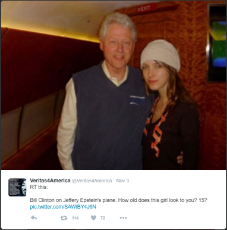
1558877952_4.jpg (105.2 KB, 1200x635, abc_epstein_flightlog_blur_lf_160211.jpg)
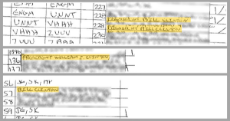
I hope they get Epstein, and I further hope he rolls over on all his guests to statutory rape island.
>>223413
Likewise. I hope they stick him with it too, and fuck his money, cuz if he has nio way 'out' I'm sure he'll turn state's evidence
Likewise. I hope they stick him with it too, and fuck his money, cuz if he has nio way 'out' I'm sure he'll turn state's evidence
>Jeffrey Epstein Arrested in NYC on Sex Trafficking-Related Charges
>Jeffrey Epstein, a wealthy, politically connected Florida financier, was arrested in New York on Saturday evening on sex trafficking-related charges, sources tell NBC 4 New York.
>Epstein is expected to appear in federal court in Manhattan on Monday, two law enforcement officials said on a condition of anonymity.
>Epstein is a wealthy hedge fund manager who once counted as friends former President Bill Clinton, Great Britain's Prince Andrew, and Trump, who was his neighbor in Palm Beach at the time.
https://web.archive.org/web/20190707010144/https://www.nbcnewyork.com/news/local/Jeffrey-Epstein-Arrest-Sources-Upper-East-Side-Mansion--512309731.html
>Jeffrey Epstein, a wealthy, politically connected Florida financier, was arrested in New York on Saturday evening on sex trafficking-related charges, sources tell NBC 4 New York.
>Epstein is expected to appear in federal court in Manhattan on Monday, two law enforcement officials said on a condition of anonymity.
>Epstein is a wealthy hedge fund manager who once counted as friends former President Bill Clinton, Great Britain's Prince Andrew, and Trump, who was his neighbor in Palm Beach at the time.
https://web.archive.org/web/20190707010144/https://www.nbcnewyork.com/news/local/Jeffrey-Epstein-Arrest-Sources-Upper-East-Side-Mansion--512309731.html
>>229878
I wonder what will happen in the end. A lot of political figures were pictured on the Lolita Express. If chaos happens, then embrace the chaos.
I wonder what will happen in the end. A lot of political figures were pictured on the Lolita Express. If chaos happens, then embrace the chaos.
>>229888
Nothing will happen. Why do you think it has taken so long to get to this point. They have been tidying up all the loose end and only one person will take all the blame. Worse than that is their will still be kiddy fucking rich/powerful people. A pox to them all.
Nothing will happen. Why do you think it has taken so long to get to this point. They have been tidying up all the loose end and only one person will take all the blame. Worse than that is their will still be kiddy fucking rich/powerful people. A pox to them all.
>>229888
You know when Presidents do their radical stuff? Second term because they can't be voted back in anyway. Alternatively a hammer drop right before the 2020 election might be a death blow to Democrats as a whole.
You know when Presidents do their radical stuff? Second term because they can't be voted back in anyway. Alternatively a hammer drop right before the 2020 election might be a death blow to Democrats as a whole.
Forgive me if I'm bluepilled on this atrocity, but did that guy actually call that godforsaken plane the "lolita express", or is it just some grotesque 4chan nickname given to it?
>>229910
>Former President Bill Clinton was a much more frequent flyer on a registered sex offender’s infamous jet than previously reported, with flight logs showing the former president taking at least 26 trips aboard the “Lolita Express” -- even apparently ditching his Secret Service detail for at least five of the flights, according to records obtained by FoxNews.com.
https://web.archive.org/web/20161009222309/http://www.foxnews.com/us/2016/05/13/flight-logs-show-bill-clinton-flew-on-sex-offenders-jet-much-more-than-previously-known.html
>Former President Bill Clinton was a much more frequent flyer on a registered sex offender’s infamous jet than previously reported, with flight logs showing the former president taking at least 26 trips aboard the “Lolita Express” -- even apparently ditching his Secret Service detail for at least five of the flights, according to records obtained by FoxNews.com.
https://web.archive.org/web/20161009222309/http://www.foxnews.com/us/2016/05/13/flight-logs-show-bill-clinton-flew-on-sex-offenders-jet-much-more-than-previously-known.html
Time to rise up against the corrupt and take back our country in the name of Our Home!
>>229914
Maybe, not forever... stuff may be going on in the background to stamp this out...
>Massive Fire Reportedly Seen On Private Island Owned By Billionaire, And Sexual Predator, Jeffrey Epstein
https://steemit.com/news/@nmwd/massive-fire-reportedly-seen-on-billionaire-and-sexual-predator-jeffrey-epstein-s-private-island
Maybe, not forever... stuff may be going on in the background to stamp this out...
>Massive Fire Reportedly Seen On Private Island Owned By Billionaire, And Sexual Predator, Jeffrey Epstein
https://steemit.com/news/@nmwd/massive-fire-reportedly-seen-on-billionaire-and-sexual-predator-jeffrey-epstein-s-private-island
>>223331
being arrested in NYC and being in the jurisdiction of SDNY makes me believe this whole thing was staged.
SDNY is full of Obama judges. I think Epstein will implicate Trump as part of a plea deal to a lesser crime. probably serve zero time.
the media is going to turn this into another Russia collusion circus.
not saying Trump is guilty of anything because he isn't, this is just a replay of the same bullshit from 2016. all I'm saying is the stage is set for another 24-7 media circus about Trump being a pedo. watch this is how they operate
being arrested in NYC and being in the jurisdiction of SDNY makes me believe this whole thing was staged.
SDNY is full of Obama judges. I think Epstein will implicate Trump as part of a plea deal to a lesser crime. probably serve zero time.
the media is going to turn this into another Russia collusion circus.
not saying Trump is guilty of anything because he isn't, this is just a replay of the same bullshit from 2016. all I'm saying is the stage is set for another 24-7 media circus about Trump being a pedo. watch this is how they operate
1562524484_1.png (28.7 KB, 590x352, 54298f08ed282e8ea5fcb109c7fd2f6746447eb76bd0f6abb7918035d7f57688.png)
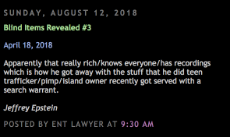
1562524484_2.png (121.6 KB, 587x970, a16f8fb990ceaaea3ce36135f073b0cbe6fa323631f41bb76ea09b03cf72b2c0.png)
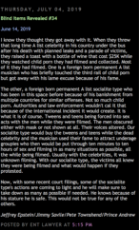
The rumours...
>>229956
>Before his sentence, the billionaire was known to hobnob with Donald Trump, Bill Clinton, Chris Tucker, Kevin Spacey, Larry Summers and Mort Zuckerman.
https://www.hollywoodreporter.com/news/jeffrey-epstein-arrested-sex-trafficking-minors-1222761
>Before his sentence, the billionaire was known to hobnob with Donald Trump, Bill Clinton, Chris Tucker, Kevin Spacey, Larry Summers and Mort Zuckerman.
https://www.hollywoodreporter.com/news/jeffrey-epstein-arrested-sex-trafficking-minors-1222761
>>229974
socializing with a big time financier isn't quite the same as fucking lolis.
the Katy Johnson shit was proven to be a lie and then there is this. Trump was basically the only person who cooperated with the investigation in 2009. watch YT take this down
[YouTube] Attorney Bradley Edwards Explains the Latest on Jeffrey Epstein's Prosecution![]()
socializing with a big time financier isn't quite the same as fucking lolis.
the Katy Johnson shit was proven to be a lie and then there is this. Trump was basically the only person who cooperated with the investigation in 2009. watch YT take this down
[YouTube] Attorney Bradley Edwards Explains the Latest on Jeffrey Epstein's Prosecution
>>229974
The list is massive and even includes Bob Dylan. There were in the past copies of two sets of black books unredacted/unrelated and at one point even the fucked up: http://lhohq.info/ included them in his background of non.sense. Go on a treasure hunt in the spud swamps and you may find them. What people should be more concerned about is the timing of the regurgence of this story.
The list is massive and even includes Bob Dylan. There were in the past copies of two sets of black books unredacted/unrelated and at one point even the fucked up: http://lhohq.info/ included them in his background of non.sense. Go on a treasure hunt in the spud swamps and you may find them. What people should be more concerned about is the timing of the regurgence of this story.
I hope this leads to something huge. However, someone on 8/pol/ mentioned this.
>Earlier a bunch of blue checkmarks were sharing photoshopped pictures of Trump with Epstein. They were all doing it, coordinated. And now they all coordinated apologies.
>Gee, it's almost as if they're priming us for something.
>Oh what, all the evidence against democrat elite pedophiles is deepfaked? Oh, that makes sense, you do have a blue checkmark after all, thanks for being honest.
Thoughts?
>Earlier a bunch of blue checkmarks were sharing photoshopped pictures of Trump with Epstein. They were all doing it, coordinated. And now they all coordinated apologies.
>Gee, it's almost as if they're priming us for something.
>Oh what, all the evidence against democrat elite pedophiles is deepfaked? Oh, that makes sense, you do have a blue checkmark after all, thanks for being honest.
Thoughts?
>U.S. prosecutors say financier Epstein trafficked girls for sex, ask victims to come forward
>American financier Jeffrey Epstein was charged with sex trafficking on Monday, as prosecutors accused him of luring dozens of girls as young as 14 to his luxury homes in New York and Florida and paying them for sex acts.
>An indictment unsealed in federal court in Manhattan accused Epstein, 66, of arranging for girls to perform nude "massages" and other sex acts, and paying some girls to recruit others.
>The former hedge fund manager "intentionally sought out minors and knew that many of his victims were in fact under the age of 18, including because, in some instances, minor victims expressly told him their age," the indictment said.
>Epstein was arrested on Saturday night at Teterboro Airport in New Jersey, where he had returned on his private plane from Paris.
>Berman said a search of Epstein's mansion in Manhattan, conducted under a search warrant, uncovered evidence including "nude photographs of what appeared to be underage girls."
>He encouraged other victims to come forward and contact prosecutors.
>Epstein first came under investigation in 2005 after police in Palm Beach, Florida, received reports he had sexually abused underage girls in his mansion there.
>By 2007, Epstein was facing a potential federal indictment for sexually abusing dozens of girls between 1999 and 2007, directing others to abuse them, and paying employees to bring victims to him, according to court filings.
>However, Epstein struck a deal to plead guilty in 2008 to a lesser Florida state felony prostitution charge. He served 13 months in a county jail, but was allowed to leave during the day to go to his office, and agreed to register as a sex offender.
>Prosecutors who helped craft the Florida agreement included Alex Acosta, then the U.S. Attorney for the Southern District of Florida and now Trump's Secretary of Labor. A spokeswoman for the Labor Department declined to comment on Sunday.
>Epstein would initially recruit victims to provide "massages," which they would perform nude or partially nude, the indictment said.
>Prosecutors said the encounters would become increasingly sexual in nature, sometimes including groping and indirect contact with victims' genitals, where Epstein would typically masturbate and ask victims to touch him while he did.
>Epstein paid girls to recruit new girls, to ensure a "steady supply of new victims to exploit" prosecutors said.
>Several of Epstein's accusers had challenged his Florida deal in court, saying they were denied a chance to express their views, violating the federal Crime Victims' Rights Act.
>In February of this year, a U.S. district judge in Florida agreed, saying the deal was illegal.
>Even so, the U.S. Department of Justice said in a court filing last month there was no reason to cancel the agreement.
http://archive.is/KJSmJ
>American financier Jeffrey Epstein was charged with sex trafficking on Monday, as prosecutors accused him of luring dozens of girls as young as 14 to his luxury homes in New York and Florida and paying them for sex acts.
>An indictment unsealed in federal court in Manhattan accused Epstein, 66, of arranging for girls to perform nude "massages" and other sex acts, and paying some girls to recruit others.
>The former hedge fund manager "intentionally sought out minors and knew that many of his victims were in fact under the age of 18, including because, in some instances, minor victims expressly told him their age," the indictment said.
>Epstein was arrested on Saturday night at Teterboro Airport in New Jersey, where he had returned on his private plane from Paris.
>Berman said a search of Epstein's mansion in Manhattan, conducted under a search warrant, uncovered evidence including "nude photographs of what appeared to be underage girls."
>He encouraged other victims to come forward and contact prosecutors.
>Epstein first came under investigation in 2005 after police in Palm Beach, Florida, received reports he had sexually abused underage girls in his mansion there.
>By 2007, Epstein was facing a potential federal indictment for sexually abusing dozens of girls between 1999 and 2007, directing others to abuse them, and paying employees to bring victims to him, according to court filings.
>However, Epstein struck a deal to plead guilty in 2008 to a lesser Florida state felony prostitution charge. He served 13 months in a county jail, but was allowed to leave during the day to go to his office, and agreed to register as a sex offender.
>Prosecutors who helped craft the Florida agreement included Alex Acosta, then the U.S. Attorney for the Southern District of Florida and now Trump's Secretary of Labor. A spokeswoman for the Labor Department declined to comment on Sunday.
>Epstein would initially recruit victims to provide "massages," which they would perform nude or partially nude, the indictment said.
>Prosecutors said the encounters would become increasingly sexual in nature, sometimes including groping and indirect contact with victims' genitals, where Epstein would typically masturbate and ask victims to touch him while he did.
>Epstein paid girls to recruit new girls, to ensure a "steady supply of new victims to exploit" prosecutors said.
>Several of Epstein's accusers had challenged his Florida deal in court, saying they were denied a chance to express their views, violating the federal Crime Victims' Rights Act.
>In February of this year, a U.S. district judge in Florida agreed, saying the deal was illegal.
>Even so, the U.S. Department of Justice said in a court filing last month there was no reason to cancel the agreement.
http://archive.is/KJSmJ
>>230133
I will never get tired of watching boomers try to wrap their heads around the marvels of post-1980s technology.
I will never get tired of watching boomers try to wrap their heads around the marvels of post-1980s technology.
>>230133
My thoughts are that around the 70s or 80s mass production of stolen abused MKUltra'ed kids were made. They were seeded into society in multiple places, government, hollywood, drug trafficking, etc. Biological robots. Paedophilia was unofficially tolerated because it added to the pool of mind controllable kids.
This might even tie in with the "alien abductees" reporting stolen babies. Pretty scary thought.
My thoughts are that around the 70s or 80s mass production of stolen abused MKUltra'ed kids were made. They were seeded into society in multiple places, government, hollywood, drug trafficking, etc. Biological robots. Paedophilia was unofficially tolerated because it added to the pool of mind controllable kids.
This might even tie in with the "alien abductees" reporting stolen babies. Pretty scary thought.
>>230169
There's a thread on /vx/ that goes into this. PizzaGate & the Arab war-for-organs-and-oil-wars were 'merely' the latest iterations of this continuance.
>>230174
Chappaquiddick Fire ring a bell? The Killer Klintons set fire to their estate and mysteriously evacuated 15 minutes before it happened, yet miraculously over 600,000 documents "were lost to the arson" including hundreds of USB's & hard drives. Not included were the roughly 1 million Klinton Foundation documents dating back to Good Old Goy Bill's run in Arkansas, his collaboration with both nigger kikes Roosevelt & Eisenhower along with their military-industrial complex senator/congressman friends operating in Arkansas off taxpayer paid land. Likewise mysteriously missing were Good Goy Bill's documents detailing the Klinton family's intimate relationships with the: Taft, Wilson, Harding, Coolidge, Hoover, Roosevelt, Truman, Johnson, Nixon, Ford, Carter, Reagan, and Bush cartel families, all of whom are (((Knights of Malta))) ordained. Gee, there can't be a conspiracy here.
There's a thread on /vx/ that goes into this. PizzaGate & the Arab war-for-organs-and-oil-wars were 'merely' the latest iterations of this continuance.
>>230174
Chappaquiddick Fire ring a bell? The Killer Klintons set fire to their estate and mysteriously evacuated 15 minutes before it happened, yet miraculously over 600,000 documents "were lost to the arson" including hundreds of USB's & hard drives. Not included were the roughly 1 million Klinton Foundation documents dating back to Good Old Goy Bill's run in Arkansas, his collaboration with both nigger kikes Roosevelt & Eisenhower along with their military-industrial complex senator/congressman friends operating in Arkansas off taxpayer paid land. Likewise mysteriously missing were Good Goy Bill's documents detailing the Klinton family's intimate relationships with the: Taft, Wilson, Harding, Coolidge, Hoover, Roosevelt, Truman, Johnson, Nixon, Ford, Carter, Reagan, and Bush cartel families, all of whom are (((Knights of Malta))) ordained. Gee, there can't be a conspiracy here.
>Epstein Claims Immunity; Prosecutors Say "Extremely Concerning" Images Seized
https://www.zerohedge.com/news/2019-07-08/epstein-indictment-unsealed-accused-sexual-exploitation-and-abuse-dozens-minor
https://www.zerohedge.com/news/2019-07-08/epstein-indictment-unsealed-accused-sexual-exploitation-and-abuse-dozens-minor
>>223331
Barr recuses himself. I guess that leaves it to Rosen. Rosen was at Kirkland and Ellis too but I don't know if he has any connection Epstein.
https://unv.is/lawandcrime.com/high-profile/william-barr-reveals-has-recused-himself-from-jeffrey-esptein-case-heres-the-reason-he-gave
Barr recuses himself. I guess that leaves it to Rosen. Rosen was at Kirkland and Ellis too but I don't know if he has any connection Epstein.
https://unv.is/lawandcrime.com/high-profile/william-barr-reveals-has-recused-himself-from-jeffrey-esptein-case-heres-the-reason-he-gave
>>230203
the judge presiding over the case is going to retire in September.
https://www.law.com/newyorklawjournal/2018/12/03/sdny-magistrate-judge-henry-pitman-set-to-retire-in-2019/?slreturn=20190608235001
the judge presiding over the case is going to retire in September.
https://www.law.com/newyorklawjournal/2018/12/03/sdny-magistrate-judge-henry-pitman-set-to-retire-in-2019/?slreturn=20190608235001
1562653926_1.jpg (118.6 KB, 731x972, 2dfd34fa966a9670402ef95b1b40df066aadb50d93427f60273b853949cde6a5.jpg)
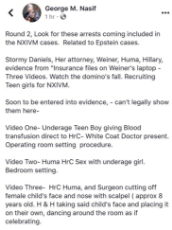
1562653926_2.jpg (147.5 KB, 1030x1144, 53178b30c31f3a299d00ff1e4a7214faa495b6361a4c81f23e8b8243658f25b6.jpg)
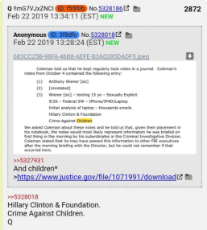
1562653926_3.jpg (155.1 KB, 1242x1445, 054390d1f1fba28b5a698e3ef3c56510bc9504441cbcd65f36dcfb6e7a8cc16e.jpg)
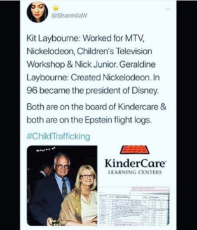
1562653926_4.jpg (78.3 KB, 850x480, 25319286e060365d5a7d41b8ec3107049c9cdec496096f7b8dccc64c3f5c2523.jpg)
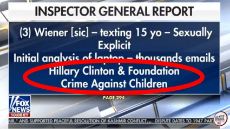
>Billionaire sex offender Epstein once claimed he co-founded Clinton Foundation
https://www.foxnews.com/us/billionaire-sex-offender-epstein-once-claimed-he-co-founded-clinton-foundation
SOON?
https://www.foxnews.com/us/billionaire-sex-offender-epstein-once-claimed-he-co-founded-clinton-foundation
SOON?
1562656240_1.jpg (30.0 KB, 317x499, 51BevU4PxbL._SX315_BO1,204,203,200_.jpg)
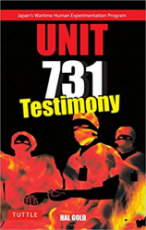
1562656240_2.jpg (32.1 KB, 333x499, 51E4LZQc cL._SX331_BO1,204,203,200_.jpg)

WEXNER/EPSTEIN suspicious history (includes Jews):
https://8ch.net/qresearch/res/6964115.html#6964457
https://8ch.net/qresearch/res/6964115.html#6964464
https://8ch.net/qresearch/res/6964115.html#6964457
https://8ch.net/qresearch/res/6964115.html#6964464
>Jeffery Epstein, a Jewish politically well-connected billionaire, has been charged with sex trafficking, according to multiple reports.
https://www.jpost.com/International/Billionaire-sex-offender-Jeffrey-Epstein-charged-with-sex-trafficking-594864
>The surname Epstein is one of the oldest Ashkenazi Jewish family names.
https://en.wikipedia.org/wiki/Epstein
That escalated fast.
https://www.jpost.com/International/Billionaire-sex-offender-Jeffrey-Epstein-charged-with-sex-trafficking-594864
>The surname Epstein is one of the oldest Ashkenazi Jewish family names.
https://en.wikipedia.org/wiki/Epstein
That escalated fast.
>Donald Trump & Jeffrey Epstein Rape Lawsuit and Affidavits
>Plaintiff Jane Doe, proceeding under a pseudonym, brings this action against Donald J. Trump and Jeffrey E. Epstein, and alleges that:
>7. Plaintiff was subject to acts of rape, sexual misconduct, criminal sexual acts, sexual abuse, forcible touching, assault, battery, intentional and reckless infliction of emotional distress, duress, false imprisonment, and threats of death and/or serious bodily injury by the Defendants that took place at several parties during the summer months of 1994. The parties were held by Defendant Epstein at a New York City residence that was being used by Defendant Epstein at 9 E. 71st St. in Manhattan. During this period, Plaintiff was a minor of age 13 and was legally incapable under New York law of consenting to sexual intercourse and the other sexual contacts detailed herein.
>9. Plaintiff was enticed by promises of money and a modeling career to attend a series of parties, with other similarly situated minor females, held at a New York City residence that was being used by Defendant Jeffrey Epstein. At least four of the parties were attended by Defendant Trump. Exhs. A and B. On information and belief, by this time in 1994, Defendant Trump had known Defendant Epstein for seven years (New York, 10/28/02), and knew that Plaintiff was then just 13 years old. Exhs. A and B.
https://www.scribd.com/doc/316341058/Donald-Trump-Jeffrey-Epstein-Rape-Lawsuit-and-Affidavits
And like magic, the 26 millionth pointless token pedophile ring bust just got a whole lot more interesting.
>Plaintiff Jane Doe, proceeding under a pseudonym, brings this action against Donald J. Trump and Jeffrey E. Epstein, and alleges that:
>7. Plaintiff was subject to acts of rape, sexual misconduct, criminal sexual acts, sexual abuse, forcible touching, assault, battery, intentional and reckless infliction of emotional distress, duress, false imprisonment, and threats of death and/or serious bodily injury by the Defendants that took place at several parties during the summer months of 1994. The parties were held by Defendant Epstein at a New York City residence that was being used by Defendant Epstein at 9 E. 71st St. in Manhattan. During this period, Plaintiff was a minor of age 13 and was legally incapable under New York law of consenting to sexual intercourse and the other sexual contacts detailed herein.
>9. Plaintiff was enticed by promises of money and a modeling career to attend a series of parties, with other similarly situated minor females, held at a New York City residence that was being used by Defendant Jeffrey Epstein. At least four of the parties were attended by Defendant Trump. Exhs. A and B. On information and belief, by this time in 1994, Defendant Trump had known Defendant Epstein for seven years (New York, 10/28/02), and knew that Plaintiff was then just 13 years old. Exhs. A and B.
https://www.scribd.com/doc/316341058/Donald-Trump-Jeffrey-Epstein-Rape-Lawsuit-and-Affidavits
And like magic, the 26 millionth pointless token pedophile ring bust just got a whole lot more interesting.
What is the actual law in New York? In the UK if a 13 year old does not actively give their age then the person having sex with them is not legally at fault. A recent case in the UK was exactly that. All the men get off because they had paid for sex but had not been informed that the girl was 13.
If she had been 12 at the time then it would have been different. I expect NY law will be just as fucked up and the girl being 13 will mean nothing substantial will happen.
If she had been 12 at the time then it would have been different. I expect NY law will be just as fucked up and the girl being 13 will mean nothing substantial will happen.
What is the actual law in New York? In the UK if a 13 year old does not actively give their age then the person having sex with them is not legally at fault. A recent case in the UK was exactly that. All the men get off because they had paid for sex but had not been informed that the girl was 13.
If she had been 12 at the time then it would have been different. I expect NY law will be just as fucked up and the girl being 13 will mean nothing substantial will happen.
If she had been 12 at the time then it would have been different. I expect NY law will be just as fucked up and the girl being 13 will mean nothing substantial will happen.
>>230296
American law does not make knowledge of the girl’s age a requirement. Sex with a minor is strict liability. (Because otherwise every defendant would lie and say they didn’t know and the crime would be impossible to prove)
American law does not make knowledge of the girl’s age a requirement. Sex with a minor is strict liability. (Because otherwise every defendant would lie and say they didn’t know and the crime would be impossible to prove)
I think you are mistaken. I think knowledge of age will be written in the law somewhere because it is not that easy to determine the difference between 17 and 18. It would therefore be an unfare law. My question is more related to what age it is considered that the person is too young to be expected to give there age.
>>230299
No, it's not. You are responsible even if the girl lied about her age. If you think she's close, you better check the ID. If she fakes her id, you are still guilty (it has happened).
No, it's not. You are responsible even if the girl lied about her age. If you think she's close, you better check the ID. If she fakes her id, you are still guilty (it has happened).
>>230299
Here's the law for you:
S 130.25 Rape in the third degree.
A person is guilty of rape in the third degree when... 2. Being twenty-one years old or more, he or she engages in sexual intercourse with another person less than seventeen years old
S 130.30 Rape in the second degree.
A person is guilty of rape in the second degree when... 1 being eighteen years old or more, he or she engages in sexual intercourse with another person less than fifteen years old;
http://ypdcrime.com/penal.law/article130.htm#p130.25
There are also crimes like continuous sexual abuse of a child, but you get the general meaning of it. At no point in the law is knowledge of the child's age a requirement to prove rape. There is in fact, no intentionality requirement for rape. There is no affirmative defense elsewhere in the law I cited for claiming that you did not know the child's age. That's because, in the various states of the United States, laws against having sex with minors are strict liability. They do not require the State to prove that a defendant knew that a "victim" was under the age of 18. The reason for this is as simple as it is obvious. If the State were required to prove that a defendant knew that a "victim" were under the age of 18, the crime would be impossible to prove beyond a reasonable doubt, and no one would ever plea guilty, nor would any jury be likely to find that that a defendant knew the victim's age beyond a reasonable doubt.
The girl lying about her age and telling you she is 18 is no defense either. If you have sex with a girl under 18, and you are more than 21 years of age, you are guilty. Period.
Here's the law for you:
S 130.25 Rape in the third degree.
A person is guilty of rape in the third degree when... 2. Being twenty-one years old or more, he or she engages in sexual intercourse with another person less than seventeen years old
S 130.30 Rape in the second degree.
A person is guilty of rape in the second degree when... 1 being eighteen years old or more, he or she engages in sexual intercourse with another person less than fifteen years old;
http://ypdcrime.com/penal.law/article130.htm#p130.25
There are also crimes like continuous sexual abuse of a child, but you get the general meaning of it. At no point in the law is knowledge of the child's age a requirement to prove rape. There is in fact, no intentionality requirement for rape. There is no affirmative defense elsewhere in the law I cited for claiming that you did not know the child's age. That's because, in the various states of the United States, laws against having sex with minors are strict liability. They do not require the State to prove that a defendant knew that a "victim" was under the age of 18. The reason for this is as simple as it is obvious. If the State were required to prove that a defendant knew that a "victim" were under the age of 18, the crime would be impossible to prove beyond a reasonable doubt, and no one would ever plea guilty, nor would any jury be likely to find that that a defendant knew the victim's age beyond a reasonable doubt.
The girl lying about her age and telling you she is 18 is no defense either. If you have sex with a girl under 18, and you are more than 21 years of age, you are guilty. Period.
>>230301
Forgot Rape in the First Degree
S 130.35 Rape in the first degree.
A person is guilty of rape in the first degree when he or she engages in sexual intercourse with another person:
3. Who is less than eleven years old; or
4. Who is less than thirteen years old and the actor is eighteen years
old or more.
http://ypdcrime.com/penal.law/article130.htm#p130.25
I want to note that some states just make it a felony to have sex with a person under 18 years of age without reference to how old the defendant is, but then add a defense for where the defendant is less than 3 years older than the "victim." It's just a different way of writing the same law. The law of the State of New York includes the 3 years older requirement in the initial description of the law. Note that it is a crime to have sex with someone 11 years old or younger regardless of how old the defendant is.
Forgot Rape in the First Degree
S 130.35 Rape in the first degree.
A person is guilty of rape in the first degree when he or she engages in sexual intercourse with another person:
3. Who is less than eleven years old; or
4. Who is less than thirteen years old and the actor is eighteen years
old or more.
http://ypdcrime.com/penal.law/article130.htm#p130.25
I want to note that some states just make it a felony to have sex with a person under 18 years of age without reference to how old the defendant is, but then add a defense for where the defendant is less than 3 years older than the "victim." It's just a different way of writing the same law. The law of the State of New York includes the 3 years older requirement in the initial description of the law. Note that it is a crime to have sex with someone 11 years old or younger regardless of how old the defendant is.
>>230295
So from what I see here, it seems like they're essentially throwing Epstein under the bus in order to try and use him to defeat/arrest/impeach Trump. That being said, a lot of said people who are trying to do this have visited Epstein's island, so they might get screw over instead.
So from what I see here, it seems like they're essentially throwing Epstein under the bus in order to try and use him to defeat/arrest/impeach Trump. That being said, a lot of said people who are trying to do this have visited Epstein's island, so they might get screw over instead.
>>230306
>So from what I see here, it seems like they're essentially throwing Epstein under the bus in order to try and use him to defeat/arrest/impeach Trump.
And what a damn good, well-timed play it is. It may even tie in with >>230203 and all the talk about 'immunity'.
Nothing will come of this token pedo bust, not because Trump won't bust Epstein, but because Trump can't bust Epstein.
Bust Epstein, and the Lolita Express collides headfirst with the Trump Train, destroying both. Of course, the Lolita Express can be rebuilt later; the same can't be said for the Trump Train. Kiddy fiddling has a funny way of breaking the spell of tribalism.
>so they might get screw over instead
Who cares? For the powers-that-be, they're all expendable anyways.
>So from what I see here, it seems like they're essentially throwing Epstein under the bus in order to try and use him to defeat/arrest/impeach Trump.
And what a damn good, well-timed play it is. It may even tie in with >>230203 and all the talk about 'immunity'.
Nothing will come of this token pedo bust, not because Trump won't bust Epstein, but because Trump can't bust Epstein.
Bust Epstein, and the Lolita Express collides headfirst with the Trump Train, destroying both. Of course, the Lolita Express can be rebuilt later; the same can't be said for the Trump Train. Kiddy fiddling has a funny way of breaking the spell of tribalism.
>so they might get screw over instead
Who cares? For the powers-that-be, they're all expendable anyways.
>>230302
http://sharedhope.org/wp-content/uploads/2014/06/Shared-Hope-State-law-survey_Mistake-of-Age-Defense_through-8.1.pdf
If I get this right NY does not allow the age excuse but other states do under certain circumstances. If the offense being made was on an privately owned Island it would therefore not be under NY law. My question would be was the sexual act in NY or did the sex happen elsewhere but the youg girl met them at another time before/after in NY.
http://sharedhope.org/wp-content/uploads/2014/06/Shared-Hope-State-law-survey_Mistake-of-Age-Defense_through-8.1.pdf
If I get this right NY does not allow the age excuse but other states do under certain circumstances. If the offense being made was on an privately owned Island it would therefore not be under NY law. My question would be was the sexual act in NY or did the sex happen elsewhere but the youg girl met them at another time before/after in NY.
>>230319
Well, that applies to buyers of sexual acts with minors, so that's a law the shows up in the context of prostitution, rather than more normal circumstances.
Okay, taking another look at this we learn that
1. The crimes allegedly took place in Palm Beach, Florida
2. Epstein was charged under Federal Law, not state law
3. Epstein was previously convicted of Sexual Trafficking (and not sexual assault)
And
So it looks to me like the relevant set of law is Florida, and that actually he can be prosecuted again for some of these same crimes by the state of Florida, because it would be a separate sovereign doing the charging, and because sexual assault and sexual trafficking are different enough crimes
A privately owned island would still be under the jurisdiction of some sort of government, so that government would have the authority to charge him with whatever. In this case it looks like it was Florida, and both the state government of Florida and the US Federal Government have relevant laws and legal authority.
Well, that applies to buyers of sexual acts with minors, so that's a law the shows up in the context of prostitution, rather than more normal circumstances.
Okay, taking another look at this we learn that
1. The crimes allegedly took place in Palm Beach, Florida
2. Epstein was charged under Federal Law, not state law
3. Epstein was previously convicted of Sexual Trafficking (and not sexual assault)
And
So it looks to me like the relevant set of law is Florida, and that actually he can be prosecuted again for some of these same crimes by the state of Florida, because it would be a separate sovereign doing the charging, and because sexual assault and sexual trafficking are different enough crimes
A privately owned island would still be under the jurisdiction of some sort of government, so that government would have the authority to charge him with whatever. In this case it looks like it was Florida, and both the state government of Florida and the US Federal Government have relevant laws and legal authority.
>>230321
I was looking at it as if Epstein would been immune and they are after other people who Epstein facilitated. If anyone goes to a club and gets lucky they may just be lucky because the club owner has paid prostitutes to do just that. If the club owner is more of a gangster those prostitutes may not be old enough and trafficked in.
In that instance it does seem unfare to end up with a child rape conviction.
Epstein gave parties where it was known that some of the ladies were being paid to have sex. Those dirty old fuckers were being entertained. The question is if they were knowledgeable of the age of the girls. Although if they can not tell the difference between a 13 year old and an 18 year old they are not particularly normal. As there was drinking and drug taking maybe these dirty old men could claim they also were not able to consent and the young girl was in fact the rapist.
The reality is I think nothing of substantial value will happen and kiddy fuckers will still be kiddy fuckers. rich/powerful people will still abuse poor.powerless people.
I was looking at it as if Epstein would been immune and they are after other people who Epstein facilitated. If anyone goes to a club and gets lucky they may just be lucky because the club owner has paid prostitutes to do just that. If the club owner is more of a gangster those prostitutes may not be old enough and trafficked in.
In that instance it does seem unfare to end up with a child rape conviction.
Epstein gave parties where it was known that some of the ladies were being paid to have sex. Those dirty old fuckers were being entertained. The question is if they were knowledgeable of the age of the girls. Although if they can not tell the difference between a 13 year old and an 18 year old they are not particularly normal. As there was drinking and drug taking maybe these dirty old men could claim they also were not able to consent and the young girl was in fact the rapist.
The reality is I think nothing of substantial value will happen and kiddy fuckers will still be kiddy fuckers. rich/powerful people will still abuse poor.powerless people.
1562744428_1.png (1.2 MB, 1474x949, f54218703282013dca0cf84f29097142f68c67c66b3debf593e02c1cb34719ba.png)

[YouTube] Jeffrey Epstein Private Island - Little St. James, U.S.V.I.![]()
https://doitq.news/ray-chandler-epstein-island-the-standard-hotel/
>“Is the Epstein case going to cause a problem [for confirmation hearings]?” Acosta had been asked. Acosta had explained, breezily, apparently, that back in the day he’d had just one meeting on the Epstein case. He’d cut the non-prosecution deal with one of Epstein’s attorneys because he had “been told” to back off, that Epstein was above his pay grade. “I was told Epstein ‘belonged to intelligence’ and to leave it alone,” he told his interviewers in the Trump transition, who evidently thought that was a sufficient answer and went ahead and hired Acosta.
https://www.thedailybeast.com/jeffrey-epsteins-sick-story-played-out-for-years-in-plain-sight
This story will suck in everyone, the anti-Trumpers, the anti-deep staters and the anti-Jews. Then Trump will be cleared. And it will spiral out and ensnare many unless they manage some sort of counter. Interesting that the alleged Israeli laser satellite was taken out before this opened up.
https://doitq.news/ray-chandler-epstein-island-the-standard-hotel/
>“Is the Epstein case going to cause a problem [for confirmation hearings]?” Acosta had been asked. Acosta had explained, breezily, apparently, that back in the day he’d had just one meeting on the Epstein case. He’d cut the non-prosecution deal with one of Epstein’s attorneys because he had “been told” to back off, that Epstein was above his pay grade. “I was told Epstein ‘belonged to intelligence’ and to leave it alone,” he told his interviewers in the Trump transition, who evidently thought that was a sufficient answer and went ahead and hired Acosta.
https://www.thedailybeast.com/jeffrey-epsteins-sick-story-played-out-for-years-in-plain-sight
This story will suck in everyone, the anti-Trumpers, the anti-deep staters and the anti-Jews. Then Trump will be cleared. And it will spiral out and ensnare many unless they manage some sort of counter. Interesting that the alleged Israeli laser satellite was taken out before this opened up.
Ivanka was also a guest of cut.cock. In his black book were also names of escort agencies, local police and ambulance and hospitals. Across all five continents. Why is the focus on trump? Because this is just a smear exercise and should be treated as such. It would not surprise me if cut.cock is killed off.
>>230341
What if the Trump angle is bait to pull in the anti-Trumpers and then re-educate them, like the Mueller report?
What if the Trump angle is bait to pull in the anti-Trumpers and then re-educate them, like the Mueller report?
Franklin abuse scandal
https://www.reddit.com/r/conspiracy/comments/9jnz16/original_content_the_franklin_scandal_a_shocking/
Child pornograpy on Pentagon computers
https://www.yahoo.com/news/blogs/upshot/pentagon-declined-investigate-hundreds-purchases-child-pornography.html
Presidio child abuse case
http://articles.latimes.com/1987-08-11/news/mn-846_1_child-molestation
Congressional Page scandals
https://en.wikipedia.org/wiki/Page_of_the_United_States_House_of_Representatives#Scandals
https://en.wikipedia.org/wiki/1983_congressional_page_sex_scandal
https://en.wikipedia.org/wiki/Mark_Foley_scandal
Dennis Hastert
https://en.wikipedia.org/wiki/Dennis_Hastert#Sex_abuse_scandal_and_federal_prosecution
Jimmy Savile abuse case
https://www.theguardian.com/media/2014/jun/26/jimmy-savile-sexual-abuse-timeline
https://en.wikipedia.org/wiki/Jimmy_Savile_sexual_abuse_scandal
Mark Dutroux case
https://en.wikipedia.org/wiki/Marc_Dutroux
https://en.wikipedia.org/wiki/White_March
Vatican covering up sexual abuse
https://www.theguardian.com/world/2003/aug/17/religion.childprotection
Hollywood pedophilia
https://www.youtube.com/watch?v=WH8fTb34EWw
[YouTube] Corey Feldman On Hollywood Pedophilia: “I Would Love To Name Names"![]()
https://www.reddit.com/r/conspiracy/comments/9jnz16/original_content_the_franklin_scandal_a_shocking/
Child pornograpy on Pentagon computers
https://www.yahoo.com/news/blogs/upshot/pentagon-declined-investigate-hundreds-purchases-child-pornography.html
Presidio child abuse case
http://articles.latimes.com/1987-08-11/news/mn-846_1_child-molestation
Congressional Page scandals
https://en.wikipedia.org/wiki/Page_of_the_United_States_House_of_Representatives#Scandals
https://en.wikipedia.org/wiki/1983_congressional_page_sex_scandal
https://en.wikipedia.org/wiki/Mark_Foley_scandal
Dennis Hastert
https://en.wikipedia.org/wiki/Dennis_Hastert#Sex_abuse_scandal_and_federal_prosecution
Jimmy Savile abuse case
https://www.theguardian.com/media/2014/jun/26/jimmy-savile-sexual-abuse-timeline
https://en.wikipedia.org/wiki/Jimmy_Savile_sexual_abuse_scandal
Mark Dutroux case
https://en.wikipedia.org/wiki/Marc_Dutroux
https://en.wikipedia.org/wiki/White_March
Vatican covering up sexual abuse
https://www.theguardian.com/world/2003/aug/17/religion.childprotection
Hollywood pedophilia
https://www.youtube.com/watch?v=WH8fTb34EWw
[YouTube] Corey Feldman On Hollywood Pedophilia: “I Would Love To Name Names"
https://thefederalistpapers.org/us/wikipedia-users-editing-epsteins-bio-remove-democrat-party-connections
>Wikipedia Users Editing Epstein’s Bio to Remove Democratic Party Connections
Of fucking course.
>Wikipedia Users Editing Epstein’s Bio to Remove Democratic Party Connections
Of fucking course.
>Acosta to take questions on his handling of Epstein case
>Labor Secretary Alex Acosta plans to make a statement Wednesday regarding his handling of a sex trafficking case involving now-jailed billionaire financier Jeffrey Epstein.
>The Labor Department said Acosta will "make a statement and answer questions" from reporters at 2:30 p.m.
http://archive.is/y4By7
>Labor Secretary Alex Acosta plans to make a statement Wednesday regarding his handling of a sex trafficking case involving now-jailed billionaire financier Jeffrey Epstein.
>The Labor Department said Acosta will "make a statement and answer questions" from reporters at 2:30 p.m.
http://archive.is/y4By7
>>230306
>throwing Epstein under the bus in order to try and use him to defeat/arrest/impeach Trump
I don't see this happening. Trump is a teetotaler and, in contrast to his cultivated playboy image portrays, a pretty straight-laced guy. Yeah, he fucks models, but he's not going to drug fueled orgies, etc. He's on record for banning epstien from his FL country club because epstien was trying to seduce a 14 year old employee. Trump hasn't even smoked a cigarette, he might as well almost be mormon.
This is even more a stretch than russia-gate.
>>230326
>If anyone goes to a club and gets lucky they may just be lucky because the club owner has paid prostitutes to do just that
Sorry, club owners don't do that. Club owners may allow hookers in, and take a cut, but you would really have to be a super-high roller in vegas for something like that to happen.
Anyway, japan-anon, don't your people go to hostess-clubs, where they pay to just talk to women? Where would you get this idea that there are clubs that people are getting fucked free by hookers? I just don't get it. I have been to clubs that you have to be a member, and it costs 10k to be a member. No one was getting fucked in there, it was mostly old guys and their plastic trophy wives. It was really oversold, wasn't impressed, but the place was billed as super exclusive, and the people who got me in really expected me to be impressed.
If someone is paying hookers to fuck you, it's so they can get a tape and blackmail you. It really doesn't happen that often, and you have to be really fucking important. None of us would ever be targets.
>throwing Epstein under the bus in order to try and use him to defeat/arrest/impeach Trump
I don't see this happening. Trump is a teetotaler and, in contrast to his cultivated playboy image portrays, a pretty straight-laced guy. Yeah, he fucks models, but he's not going to drug fueled orgies, etc. He's on record for banning epstien from his FL country club because epstien was trying to seduce a 14 year old employee. Trump hasn't even smoked a cigarette, he might as well almost be mormon.
This is even more a stretch than russia-gate.
>>230326
>If anyone goes to a club and gets lucky they may just be lucky because the club owner has paid prostitutes to do just that
Sorry, club owners don't do that. Club owners may allow hookers in, and take a cut, but you would really have to be a super-high roller in vegas for something like that to happen.
Anyway, japan-anon, don't your people go to hostess-clubs, where they pay to just talk to women? Where would you get this idea that there are clubs that people are getting fucked free by hookers? I just don't get it. I have been to clubs that you have to be a member, and it costs 10k to be a member. No one was getting fucked in there, it was mostly old guys and their plastic trophy wives. It was really oversold, wasn't impressed, but the place was billed as super exclusive, and the people who got me in really expected me to be impressed.
If someone is paying hookers to fuck you, it's so they can get a tape and blackmail you. It really doesn't happen that often, and you have to be really fucking important. None of us would ever be targets.
>>230364
Link to upcoming stream by Fox Business
[YouTube] Labor Secretary Alexander Acosta holds press conference![]()
Link to upcoming stream by Fox Business
[YouTube] Labor Secretary Alexander Acosta holds press conference
>So Was QAnon … Right?
...
>Of course, this wild theory turned out to be bogus. They got the date wrong: July 4 and 5 both passed without incident. It wasn’t until July 6 that the feds handed out an indictment over a global underage sex-trafficking ring implicating U.S. presidents, heads of government, top lawyers, world-famous actors, and a member of the English royal family ( https://gawker.com/billionaire-pervert-jeffrey-epstein-and-his-famous-frie-1679246399 ). And, to be fair, JFK Jr. didn’t emerge from hiding. Otherwise, though, the Saturday arrest of well-connected financier and convicted sex criminal Jeffrey Epstein on one count of sex trafficking ( http://nymag.com/intelligencer/2019/07/all-we-know-about-the-new-case-against-jeffrey-epstein.html ) and one count of conspiracy to commit sex trafficking went a long way toward fulfilling the QAnon prediction — and therefore raised a troubling question: Did QAnon turn out to be kind of, well, right?
...
https://nymag.com/intelligencer/2019/07/does-the-jeffrey-epstein-indictment-qanon.html
...
>Of course, this wild theory turned out to be bogus. They got the date wrong: July 4 and 5 both passed without incident. It wasn’t until July 6 that the feds handed out an indictment over a global underage sex-trafficking ring implicating U.S. presidents, heads of government, top lawyers, world-famous actors, and a member of the English royal family ( https://gawker.com/billionaire-pervert-jeffrey-epstein-and-his-famous-frie-1679246399 ). And, to be fair, JFK Jr. didn’t emerge from hiding. Otherwise, though, the Saturday arrest of well-connected financier and convicted sex criminal Jeffrey Epstein on one count of sex trafficking ( http://nymag.com/intelligencer/2019/07/all-we-know-about-the-new-case-against-jeffrey-epstein.html ) and one count of conspiracy to commit sex trafficking went a long way toward fulfilling the QAnon prediction — and therefore raised a troubling question: Did QAnon turn out to be kind of, well, right?
...
https://nymag.com/intelligencer/2019/07/does-the-jeffrey-epstein-indictment-qanon.html
>>230373
It is lovely when all the pieces fall into place. Hoping the domino's are starting to fall in rapid succession.
It is lovely when all the pieces fall into place. Hoping the domino's are starting to fall in rapid succession.
>>230366
Press conference is about to start
[YouTube] Labor Secretary Acosta defends his handling of Epstein case![]()
Press conference is about to start
[YouTube] Labor Secretary Acosta defends his handling of Epstein case
>>230365
Bad publicity rather than conviction. They throw mud, they waste time on trivial stuff.
As for clubbing your flag is wrong unless you live in a Scotish cave. Clubbing in the UK was essentially a place to get a shag. The most successful clubs were the ones with a good shag rep. In Japan where it is more reserved clubs are basically for narcicist. Japanese men just pay for sex instead.
My suggestion is that club owners provide prostitutes because it improves customer flow. If a club is carging 20 monkeys a year they would not need to.
Where in the UK does a club charge that much? Basically your chump throwing needs a bit of improvement.
Bad publicity rather than conviction. They throw mud, they waste time on trivial stuff.
As for clubbing your flag is wrong unless you live in a Scotish cave. Clubbing in the UK was essentially a place to get a shag. The most successful clubs were the ones with a good shag rep. In Japan where it is more reserved clubs are basically for narcicist. Japanese men just pay for sex instead.
My suggestion is that club owners provide prostitutes because it improves customer flow. If a club is carging 20 monkeys a year they would not need to.
Where in the UK does a club charge that much? Basically your chump throwing needs a bit of improvement.
I did go to a snack bar. A place where you pay for conversation. It was reasonable as the drink was normal price and the hostess made many snacks. She was at least 60 so I expect these places are more for old married men avoiding wives rather than wanting sex.
>>230447
>Where in the UK does a club charge that much? Basically your chump throwing needs a bit of improvement.
I'm on VPN. It was a club in dallas. Dallas is a different place. I really enjoy when my job flies me there, but I don't know that I could live there.
>Clubbing in the UK was essentially a place to get a shag.
That's what all the brits say including the women, but I didn't see the locals actually pick up that much at clubs. Brits are all talk, they say outrageous shit, and the more seriously they say it, the funnier it is to them. If you don't understand that, I can see where your misconceptions come from. It's a very different sense of humor. I have seen conversations between brits that get progressively stranger and freakier, and they see how far they can take it before one of them breaks down and laughs. The person who laughed is the loser.
>The most successful clubs were the ones with a good shag rep.
And you don't think that spreading rumors is cheaper, safer and more legal than hiring whores to take all cocks in the restroom? Seriously, you are a special kind of sperg. Have you ever even met a club promoter? They will say anything to get people to go to a club. They are worse than used car salesman.
How many women have you personally fucked from a club in the UK?
>My suggestion is that club owners provide prostitutes because it improves customer flow.
Maybe in thailand, but even there, where you can get a fucking hot hooker for $20 american, the club owners aren't paying anyone to suck dick. I mean, there were hookers there, ready to fuck, but you better believe you were going to have to pay. You really overestimate the profitability of clubs. To really get a reputation, you would have to have a stable of girls and they would have to fuck a sizeable percentage of clients a night. At that point, you should really just open a brothel, charge a few hundred dollars (obviously not thailand) a fuck and make more money. It just doesn't make any sense.
For the record, I like you japs, you are some strange, funny motherfuckers. But you read the shit online and you think it's true. It's not, ESPECIALLY, the british media. The normal british media is mostly "national enquirer" tier in the US.
t. world travelling MBAanon
>Where in the UK does a club charge that much? Basically your chump throwing needs a bit of improvement.
I'm on VPN. It was a club in dallas. Dallas is a different place. I really enjoy when my job flies me there, but I don't know that I could live there.
>Clubbing in the UK was essentially a place to get a shag.
That's what all the brits say including the women, but I didn't see the locals actually pick up that much at clubs. Brits are all talk, they say outrageous shit, and the more seriously they say it, the funnier it is to them. If you don't understand that, I can see where your misconceptions come from. It's a very different sense of humor. I have seen conversations between brits that get progressively stranger and freakier, and they see how far they can take it before one of them breaks down and laughs. The person who laughed is the loser.
>The most successful clubs were the ones with a good shag rep.
And you don't think that spreading rumors is cheaper, safer and more legal than hiring whores to take all cocks in the restroom? Seriously, you are a special kind of sperg. Have you ever even met a club promoter? They will say anything to get people to go to a club. They are worse than used car salesman.
How many women have you personally fucked from a club in the UK?
>My suggestion is that club owners provide prostitutes because it improves customer flow.
Maybe in thailand, but even there, where you can get a fucking hot hooker for $20 american, the club owners aren't paying anyone to suck dick. I mean, there were hookers there, ready to fuck, but you better believe you were going to have to pay. You really overestimate the profitability of clubs. To really get a reputation, you would have to have a stable of girls and they would have to fuck a sizeable percentage of clients a night. At that point, you should really just open a brothel, charge a few hundred dollars (obviously not thailand) a fuck and make more money. It just doesn't make any sense.
For the record, I like you japs, you are some strange, funny motherfuckers. But you read the shit online and you think it's true. It's not, ESPECIALLY, the british media. The normal british media is mostly "national enquirer" tier in the US.
t. world travelling MBAanon
>>230482
Firstly I am not Japanese and that shoud be fucking obvious.
Secondly I would say in my young days I would get lucky in a club about once a month. That was the norm. So not every visit but enough to be worth the entrance fee and the more expensive booze. This was before Leah-Betts when drugs were normally removed from you by the bouncers just to be re-sold inside by the selected dealers.
Thirdly I am a dirty fucker and I have had my cock sucked between main course and desert at the local izakiya. It does happen if your bold enough to ask.
Forthly there are ladies in the UK who will fuck for the price of a meal for their kids. It is in fact a problem of poverty in the UK that some ladies are going back to being sex workers. In is well known in Japan that the gansters import sex workers from other asian countries.
I think pricing of sex workers and gangster acitivty are massive and if the whores are cheap enough it would be worth it. The clubs make the money off expensive booze and the more people drinking piss the better.
I would say that when I was approached outside a station the lady was going to charge 15,000 yen for an hour but I think she assumed I was a buisness man and frankly who needs an hour.
Firstly I am not Japanese and that shoud be fucking obvious.
Secondly I would say in my young days I would get lucky in a club about once a month. That was the norm. So not every visit but enough to be worth the entrance fee and the more expensive booze. This was before Leah-Betts when drugs were normally removed from you by the bouncers just to be re-sold inside by the selected dealers.
Thirdly I am a dirty fucker and I have had my cock sucked between main course and desert at the local izakiya. It does happen if your bold enough to ask.
Forthly there are ladies in the UK who will fuck for the price of a meal for their kids. It is in fact a problem of poverty in the UK that some ladies are going back to being sex workers. In is well known in Japan that the gansters import sex workers from other asian countries.
I think pricing of sex workers and gangster acitivty are massive and if the whores are cheap enough it would be worth it. The clubs make the money off expensive booze and the more people drinking piss the better.
I would say that when I was approached outside a station the lady was going to charge 15,000 yen for an hour but I think she assumed I was a buisness man and frankly who needs an hour.
>Ann Coulter Thinks Epstein Had A "State Sponsor" & Was Running A "Blackmailing" Operation
https://www.zerohedge.com/news/2019-07-09/ann-coulter-thinks-epstein-had-state-sponsor-was-running-blackmailing-operation
https://www.zerohedge.com/news/2019-07-09/ann-coulter-thinks-epstein-had-state-sponsor-was-running-blackmailing-operation
>Jeffrey Epstein's Wikipedia Page Stealth-Edited To Remove Ties To Democrats
>In the wake of Jeffrey Epstein's weekend arrest, an observant Twitter user noticed that someone has edited the billionaire pedophile's Wikipedia page to remove all mention of Democrats who have flown on the "Lolita Express" - the nickname given to his private Boeing 727 jet which was reportedly outfitted with a bed.
https://www.zerohedge.com/news/2019-07-09/jeffrey-epsteins-wikipedia-page-stealth-edited-remove-ties-democrats
>In the wake of Jeffrey Epstein's weekend arrest, an observant Twitter user noticed that someone has edited the billionaire pedophile's Wikipedia page to remove all mention of Democrats who have flown on the "Lolita Express" - the nickname given to his private Boeing 727 jet which was reportedly outfitted with a bed.
https://www.zerohedge.com/news/2019-07-09/jeffrey-epsteins-wikipedia-page-stealth-edited-remove-ties-democrats
>No Way Will Epstein Be Allowed to Expose Political Class Pedos
>I will be sincerely surprised if the latest effort to put away child sex ring leader Jeffrey Epstein results in outing members of the political class.
>And even if names are revealed—and quite a few already have—there is simply no way a criminal like Bill Clinton will be charged with raping minors and thrown in prison.
https://www.checkpointasia.net/no-way-will-epstein-be-allowed-to-expose-political-class-pedos/
>I will be sincerely surprised if the latest effort to put away child sex ring leader Jeffrey Epstein results in outing members of the political class.
>And even if names are revealed—and quite a few already have—there is simply no way a criminal like Bill Clinton will be charged with raping minors and thrown in prison.
https://www.checkpointasia.net/no-way-will-epstein-be-allowed-to-expose-political-class-pedos/
>>230507
... unless the threat has become so existential that a cold civil war is under way in the US.
... unless the threat has become so existential that a cold civil war is under way in the US.
Maybe a Trumpesky way of dealing with global warming by reducing the population with a full on civil war. Sadly that is as likely as cut.cock going to prison.
>>230506
Wiki has always been factually useless. Either you end up ping-pong argument with someone over a trivial detail or your IP banned totally. Having said that an edit I did two days ago has yet to be changed so at least some pages go unguarded.
Wiki has always been factually useless. Either you end up ping-pong argument with someone over a trivial detail or your IP banned totally. Having said that an edit I did two days ago has yet to be changed so at least some pages go unguarded.
>>230514
>Wiki has always been factually useless.
The point here is that normals use it as a main source for reference.
>Wiki has always been factually useless.
The point here is that normals use it as a main source for reference.
>>230515
So called normals use twitter as a news source. UK politicians base policy on their twitter feed. That is probably the scariest part of UK democracy at the moment.
So called normals use twitter as a news source. UK politicians base policy on their twitter feed. That is probably the scariest part of UK democracy at the moment.
1562858614_1.jpg (63.7 KB, 543x474, ideology-cycle-alignment-dnd.jpg)
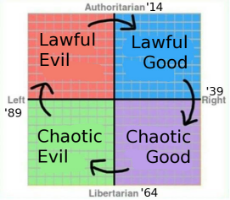
>>230517
Right now the internet is factionalised into camps. But I see a future where the camps will cross pollinate info and a meta-understanding will take over. Traditional media is toast. Conspiracies will normie'ise, but the 2-way ideological oscilations will remain (Left-emotions vs Right-logic & State rights vs Individual rights) because they are fundamental permanently existing conditions/conflicts/dualities.
2014 was when Left and Right reached equal popular power. This broke out into the current US civil cold war, coming to the surface through Trump (2016), because the Left is in existential demise and panicked and the Right is in ascendance.
Notice that the diversionary school shootings have stopped? This suggests some background clean up has occurred.
Right now the internet is factionalised into camps. But I see a future where the camps will cross pollinate info and a meta-understanding will take over. Traditional media is toast. Conspiracies will normie'ise, but the 2-way ideological oscilations will remain (Left-emotions vs Right-logic & State rights vs Individual rights) because they are fundamental permanently existing conditions/conflicts/dualities.
2014 was when Left and Right reached equal popular power. This broke out into the current US civil cold war, coming to the surface through Trump (2016), because the Left is in existential demise and panicked and the Right is in ascendance.
Notice that the diversionary school shootings have stopped? This suggests some background clean up has occurred.
1562863833.jpg (884.3 KB, 1944x1152, CDAN Jeffrey Epstein version 4.jpg)
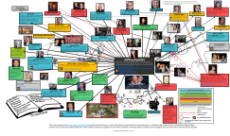
https://www.crazydaysandnights.net/2019/07/the-epstein-diagram.html
comments are interesting.
clamscan 'CDAN Jeffrey Epstein version 4.pdf'
CDAN Jeffrey Epstein version 4.pdf: OK
----------- SCAN SUMMARY -----------
Known viruses: 6209250
Engine version: 0.101.2
Scanned directories: 0
Scanned files: 1
Infected files: 0
Data scanned: 6.17 MB
Data read: 2.02 MB (ratio 3.05:1)
Time: 33.856 sec (0 m 33 s)
comments are interesting.
clamscan 'CDAN Jeffrey Epstein version 4.pdf'
CDAN Jeffrey Epstein version 4.pdf: OK
----------- SCAN SUMMARY -----------
Known viruses: 6209250
Engine version: 0.101.2
Scanned directories: 0
Scanned files: 1
Infected files: 0
Data scanned: 6.17 MB
Data read: 2.02 MB (ratio 3.05:1)
Time: 33.856 sec (0 m 33 s)
>>230295
That story about Trump raping a 13yo came out during the flurry of false rape accusations against Trump in 2016. Even Jezebel didn't believe it. Turns out this Katie Johnson might not even exist.
http://archive.is/RpRuy
That story about Trump raping a 13yo came out during the flurry of false rape accusations against Trump in 2016. Even Jezebel didn't believe it. Turns out this Katie Johnson might not even exist.
http://archive.is/RpRuy
What will happen as the mockingbird media continues to lose control over the narrative?
...
>We should keep all of this in mind the next time we feel inclined to sneer at so-called "low-information voters," especially the kookier sort. You know the people I mean. Wackos. Gun nuts. 8channers. Conspiracy theorists in Middle America who watch InfoWars (one of the few journalistic outlets to discuss the issue of pedophilia regularly) and post about QAnon and "spirit cooking" and the lizard people. The news that a globalized cabal of billionaires and politicians and journalists and Hollywood bigwigs might be flying around the world raping teenaged girls will not surprise them in the least because it is what they have long suspected. For the rest of us it is like finding out that the Jersey Devil is real or turning on cable news and finding Anderson Cooper and his panel engaged in a matter-of-fact discussion of Elvis’s residence among the Zixls on the 19th moon of Dazotera.
...
https://theweek.com/articles/851426/jeffrey-epstein-case-why-people-believe-pizzagate
and the internet is the news....
...
>We should keep all of this in mind the next time we feel inclined to sneer at so-called "low-information voters," especially the kookier sort. You know the people I mean. Wackos. Gun nuts. 8channers. Conspiracy theorists in Middle America who watch InfoWars (one of the few journalistic outlets to discuss the issue of pedophilia regularly) and post about QAnon and "spirit cooking" and the lizard people. The news that a globalized cabal of billionaires and politicians and journalists and Hollywood bigwigs might be flying around the world raping teenaged girls will not surprise them in the least because it is what they have long suspected. For the rest of us it is like finding out that the Jersey Devil is real or turning on cable news and finding Anderson Cooper and his panel engaged in a matter-of-fact discussion of Elvis’s residence among the Zixls on the 19th moon of Dazotera.
...
https://theweek.com/articles/851426/jeffrey-epstein-case-why-people-believe-pizzagate
and the internet is the news....
>>230552
Still thinking there is a "left and "right" when it's clearly Zionism that is fucking things up.
Still thinking there is a "left and "right" when it's clearly Zionism that is fucking things up.
>>230587
Exploiting the cycle is not the same as making the cycle. However I understand the need to blame a particular group because it gives the hope that if the group is stopped all the problems go away.
If every Zionist disappeared humanity would be still as bad. They aren't the only psychopaths nature makes.
Exploiting the cycle is not the same as making the cycle. However I understand the need to blame a particular group because it gives the hope that if the group is stopped all the problems go away.
If every Zionist disappeared humanity would be still as bad. They aren't the only psychopaths nature makes.
>Dershowitz: 'I Kept My Underwear On' During Massage At Epstein's Mansion
https://embed.crooksandliars.com/embed/c8m4BC2P
Too funny.
https://embed.crooksandliars.com/embed/c8m4BC2P
Too funny.
>>230589
>I understand the need to blame a particular group because it gives the hope
It is not so simple, but removing the jews is the beginning to the solution, which cannot be integral without to tackle the top kikes (banksters and alike).
>I understand the need to blame a particular group because it gives the hope
It is not so simple, but removing the jews is the beginning to the solution, which cannot be integral without to tackle the top kikes (banksters and alike).
>>230552
>>230589
If every jew on earth were to die today.
There would still be liberals and they would still be communists. New elites would take their place and do the same things as the jews for the same reasons. blacks will still be black. 4th and 5th generation immigrants will still be civic nationalists and vote for open immigration (JFK & Candice Owens). And many more (platonists, traitors, the mentally ill, hedonists etc.)
Anon was just trying to make a point on the cyclical behavior of the masses, no one here denies the jewish problem, jews are but one of many problems in this world. But other problems, such as liberals, will always exist independent of jewish influence and must be solved as needed.
>>230589
If every jew on earth were to die today.
There would still be liberals and they would still be communists. New elites would take their place and do the same things as the jews for the same reasons. blacks will still be black. 4th and 5th generation immigrants will still be civic nationalists and vote for open immigration (JFK & Candice Owens). And many more (platonists, traitors, the mentally ill, hedonists etc.)
Anon was just trying to make a point on the cyclical behavior of the masses, no one here denies the jewish problem, jews are but one of many problems in this world. But other problems, such as liberals, will always exist independent of jewish influence and must be solved as needed.
>Did Pedophile Jeffrey Epstein Work for Mossad?
>The extent of Israeli spying directed against the United States is a huge story that is only rarely addressed in the mainstream media. The Jewish state regularly tops the list for ostensibly friendly countries that aggressively conduct espionage against the U.S
http://www.unz.com/pgiraldi/did-pedophile-jeffrey-epstein-work-for-mossad/
>The extent of Israeli spying directed against the United States is a huge story that is only rarely addressed in the mainstream media. The Jewish state regularly tops the list for ostensibly friendly countries that aggressively conduct espionage against the U.S
http://www.unz.com/pgiraldi/did-pedophile-jeffrey-epstein-work-for-mossad/
You know what triggers my OCD?
Mohammed was over 40 when he married a 6 year old girl named Aisha and fucked her at age 9.
Why can't those numbers be 9 and 11?
Muslims did 9/11 with the aid of the Jews.
Mohammed was over 40 when he married a 6 year old girl named Aisha and fucked her at age 9.
Why can't those numbers be 9 and 11?
Muslims did 9/11 with the aid of the Jews.
What triggers me is journalist like you invading corners of the internet that are not yours. Stick to BBC websites where you shit is polished for you.
>>230610
An interesting area of study would be the influence of Jewry on French intellectuals during the "Enlightenment," because it was the influence of such philosophers as Voltaire and Rousseau that really got the ball rolling. One could argue that this arose largely independent of Talmudic thought, unless a clear connection was made.
Though, according to Nick Land the problem started with the Protestant Revolt in the first place.
An interesting area of study would be the influence of Jewry on French intellectuals during the "Enlightenment," because it was the influence of such philosophers as Voltaire and Rousseau that really got the ball rolling. One could argue that this arose largely independent of Talmudic thought, unless a clear connection was made.
Though, according to Nick Land the problem started with the Protestant Revolt in the first place.
1562905199.mp4 (38.4 MB, Resolution:854x480 Length:00:12:02, The Paris Commune A Blueprint for Western Cultural Collapse [by TheLastWhiteMan].mp4) [play once] [loop]
![The Paris Commune A Blueprint for Western Cultural Collapse [by TheLastWhiteMan].mp4](/images/thumb/F863FD6A92991B6F1CDBD2C165433E89-40229335.png)
>>230610
>But other problems, such as liberals, will always exist independent of jewish influence and must be solved as needed.
>The liberal problem
Check this out: "The Paris Commune: A Blueprint for Western Cultural Collapse"
https://www.bitchute.com/video/BnxmXKqLXjPF/
>But other problems, such as liberals, will always exist independent of jewish influence and must be solved as needed.
>The liberal problem
Check this out: "The Paris Commune: A Blueprint for Western Cultural Collapse"
https://www.bitchute.com/video/BnxmXKqLXjPF/
>>230649
Both Voltaire and Rousseau had syphilis and so did hitler when he fucked a hooker in his youth. Why not expand your foolishness into studying how VD causes political mania.
Both Voltaire and Rousseau had syphilis and so did hitler when he fucked a hooker in his youth. Why not expand your foolishness into studying how VD causes political mania.
>>230663
>Both Voltaire and Rousseau had syphilis and so did hitler when he fucked a hooker in his youth
Don't forget that Moses' anus was torn apart by a camel with gonorrhea.
>Both Voltaire and Rousseau had syphilis and so did hitler when he fucked a hooker in his youth
Don't forget that Moses' anus was torn apart by a camel with gonorrhea.
>>230666
>>230667
Looks safe (and using Norton safe search said it was clean). But added an archived version.
https://web.archive.org/web/20190712145531/https://www.natureasia.com/en/nmiddleeast/article/10.1038/nmiddleeast.2017.141
>>230667
Looks safe (and using Norton safe search said it was clean). But added an archived version.
https://web.archive.org/web/20190712145531/https://www.natureasia.com/en/nmiddleeast/article/10.1038/nmiddleeast.2017.141
>Alex Acosta resigns as labor secretary amid intense scrutiny of his handling of Jeffrey Epstein case
>Labor Secretary Alex Acosta resigned Friday amid intense scrutiny of his role as a U.S. attorney a decade ago in a deal with Jeffrey Epstein that allowed the financier to plead guilty to lesser offenses in a sex-crimes case.
>President Trump told reporters Friday morning that Acosta had decided to step aside. He called Acosta a “great labor secretary, not a good one” and a “tremendous talent.”
>“This was him, not me,” Trump said of the resignation decision, as Acosta stood by his side. “I said to Alex, you don’t have to do this.”
>Acosta, the only Hispanic in Trump’s Cabinet, said he had submitted his resignation to take effect in a week.
>“I don’t think it’s right or fair to have this administration’s labor department have Epstein be the focus instead of the incredible economy we have today,” Acosta said. “It would be selfish for me to stay in the position and continue talking about a case that is 12 years old.”
http://archive.is/uMg5J
>Labor Secretary Alex Acosta resigned Friday amid intense scrutiny of his role as a U.S. attorney a decade ago in a deal with Jeffrey Epstein that allowed the financier to plead guilty to lesser offenses in a sex-crimes case.
>President Trump told reporters Friday morning that Acosta had decided to step aside. He called Acosta a “great labor secretary, not a good one” and a “tremendous talent.”
>“This was him, not me,” Trump said of the resignation decision, as Acosta stood by his side. “I said to Alex, you don’t have to do this.”
>Acosta, the only Hispanic in Trump’s Cabinet, said he had submitted his resignation to take effect in a week.
>“I don’t think it’s right or fair to have this administration’s labor department have Epstein be the focus instead of the incredible economy we have today,” Acosta said. “It would be selfish for me to stay in the position and continue talking about a case that is 12 years old.”
http://archive.is/uMg5J
MSNBC Contributor says Epstein - Acosta case is literally Pizzagate
https://youtu.be/9Ezmiz7gJB8 (1:12)
https://youtu.be/9Ezmiz7gJB8 (1:12)
Epstein's first accuser's under oath testimony with photos while from 15 years old.
http://images.politico.com/global/2015/02/03/edwardsdershaff1.pdf
http://images.politico.com/global/2015/02/03/edwardsdershaff1.pdf
>>231165
Jesus Christ some inept idiot did the "redaction" only making background black.
>DECLARATION OF VIRGINIA ROBERTS
> My name is Virginia Roberts and I was born in August, 1983.
Jesus Christ some inept idiot did the "redaction" only making background black.
>DECLARATION OF VIRGINIA ROBERTS
> My name is Virginia Roberts and I was born in August, 1983.
>>231168
Wonder if it was a calculated "redaction blunder" to hurt either Virginia or Epstein, or if it was an accident.
Wonder if it was a calculated "redaction blunder" to hurt either Virginia or Epstein, or if it was an accident.
>>231169
The document is a curious mix of digital and image PDF pages. Page 13 is a image with a proper censorship.
The document is a curious mix of digital and image PDF pages. Page 13 is a image with a proper censorship.
1563315899.jpg (25.4 KB, 650x487, c026ced0b36ac29fa81748350602be02284dfc9f.jpg)
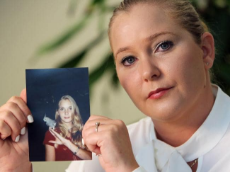
>>231210
>Ms Ransome claimed she tried to swim off the island only to be found by a search party that included Epstein and his cohort Ms Maxwell, Fox News reported.
>Ms Ransome claimed she tried to swim off the island only to be found by a search party that included Epstein and his cohort Ms Maxwell, Fox News reported.
>>231193
Source? I'm not saying I don't believe it but I couldn't find anything when I tried looking it up.
Source? I'm not saying I don't believe it but I couldn't find anything when I tried looking it up.
>>231219
Yeh it's in the NEWS article https://archive.is/vNVAx but I also found nothing on the linked Fox News.
Yeh it's in the NEWS article https://archive.is/vNVAx but I also found nothing on the linked Fox News.
>>231219
More details of the allegations by Ransome (probably from some court document) but no source.
https://www.thedailybeast.com/how-did-trump-and-clinton-pal-jeffrey-epstein-escape-metoo
More details of the allegations by Ransome (probably from some court document) but no source.
https://www.thedailybeast.com/how-did-trump-and-clinton-pal-jeffrey-epstein-escape-metoo
>>231231
You should. Glowniggers might be spreading misinformation to make us look bad and throw us off the track of the real offenders.
You should. Glowniggers might be spreading misinformation to make us look bad and throw us off the track of the real offenders.
1563450871.mp4 (758.1 KB, Resolution:854x480 Length:00:00:10, Alan Dershowitz Lady Rothschild introduced me to Epstein.mp4) [play once] [loop]
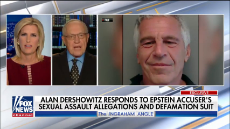
>(((Alan Dershowitz))): "(((Lady Rothschild))) introduced me to (((Epstein)))"
>Rothschild
Interesting, now this important kike is naming VIP kikes as also related to the issue; sort of: "if I go down, everybody will come with me".
>Rothschild
Interesting, now this important kike is naming VIP kikes as also related to the issue; sort of: "if I go down, everybody will come with me".
>>231558
Rothchild is a common name and there is no crime in being introduced to a kiddy fiddler. Chances are that everyone who has ever been a churchgoer has been introduced to someone in the congregation that likes to fuck children. Your logic would condemn the entire population of Ireland and Northern Ireland.
Rothchild is a common name and there is no crime in being introduced to a kiddy fiddler. Chances are that everyone who has ever been a churchgoer has been introduced to someone in the congregation that likes to fuck children. Your logic would condemn the entire population of Ireland and Northern Ireland.
1563507574.mp4 (13.1 MB, Resolution:854x480 Length:00:04:17, Jeffrey Epstein Denied Bail!.mp4) [play once] [loop]

>>231720
It is a hiring add.
I can imagine that as SJWs already infiltrated the GNU kernel, OSCON is not the exception.
Good luck with those snowflakes.
It is a hiring add.
I can imagine that as SJWs already infiltrated the GNU kernel, OSCON is not the exception.
Good luck with those snowflakes.
...
>We all build up recognisable patterns of behaviour over time. When you investigate someone, you usually start by identifying these patterns and then looking for any divergences from the anticipated outcomes. In Epstein’s planes flight manifest, a pattern which was visible from the information available is how he would use his private jet. He would use the plane for two main reasons. Most commonly he would fly himself and a number of his entourage to a destination, or alternatively he would fly people to meet him. The rarest occurrence was when Epstein would fly without any of his usual entourage and just one other passenger. There was only one name that jumped out from the flight manifest as a good example of when Epstein alternated from his routine. His second meeting with Nicole Junkermann.
...
>The link between Nicole Junkermann, the Israeli state intelligence services and the Israeli Defence Force is not a tenuous one.
...
>One of the directors of Carbyne is Nicole Junkermann. The chairman of the board of directors is Ehud Barak, the 10th Prime Minister of Israel, the 14th Chief of Staff of the Israel Defense Forces, former Minister of Defense and former Head of Military Intelligence for Israel. Ehud Barak has had a long history as one of the more public faces of Israeli covert operations. Before he was Prime Minister, Ehud Barak was a big name in the IDF. Through the 1970’s, he led many operations including famously disguising himself as a woman to kill members of the PLO (Palestinian Liberation Organisation). Ehud Barak has already been linked with Epstein, and Benjamin Netanyahu has helped to highlight those links for his own political gain.
...
https://theswamp.media/the-epstein-associate-nobody-s-talking-about-the-idf-linked-bond-girl-infiltrating-the-uk-nhs
>We all build up recognisable patterns of behaviour over time. When you investigate someone, you usually start by identifying these patterns and then looking for any divergences from the anticipated outcomes. In Epstein’s planes flight manifest, a pattern which was visible from the information available is how he would use his private jet. He would use the plane for two main reasons. Most commonly he would fly himself and a number of his entourage to a destination, or alternatively he would fly people to meet him. The rarest occurrence was when Epstein would fly without any of his usual entourage and just one other passenger. There was only one name that jumped out from the flight manifest as a good example of when Epstein alternated from his routine. His second meeting with Nicole Junkermann.
...
>The link between Nicole Junkermann, the Israeli state intelligence services and the Israeli Defence Force is not a tenuous one.
...
>One of the directors of Carbyne is Nicole Junkermann. The chairman of the board of directors is Ehud Barak, the 10th Prime Minister of Israel, the 14th Chief of Staff of the Israel Defense Forces, former Minister of Defense and former Head of Military Intelligence for Israel. Ehud Barak has had a long history as one of the more public faces of Israeli covert operations. Before he was Prime Minister, Ehud Barak was a big name in the IDF. Through the 1970’s, he led many operations including famously disguising himself as a woman to kill members of the PLO (Palestinian Liberation Organisation). Ehud Barak has already been linked with Epstein, and Benjamin Netanyahu has helped to highlight those links for his own political gain.
...
https://theswamp.media/the-epstein-associate-nobody-s-talking-about-the-idf-linked-bond-girl-infiltrating-the-uk-nhs
1563518098_1.jpg (20.8 KB, 390x630, 04A95043-BB8C-455D-8A1F-1F5C5644D6DD.jpeg)
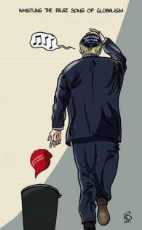
1563518098_2.jpg (58.6 KB, 960x705, 4C955E9F-3636-4922-9E60-CBB1075ECD9F.jpeg)
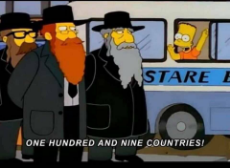
1563518098_3.jpg (37.1 KB, 246x369, 13C5553A-FEC2-4E8D-BE66-71CBA47DD991.jpeg)

1563518098_4.jpg (55.8 KB, 640x557, 3AD4E74C-603E-4A15-83C5-48B85B031930.jpeg)

1563518098_5.jpg (105.6 KB, 910x1024, 20BCC851-D93E-4959-834F-6507458C6D25.jpeg)

Dont let the CIA or MOSSAD fool you right now. They are trying to make criticism of israel look like it’s a “liberal” thing. I disagree with the majority of Omen’s political beliefs but when Bibi was implicated in the Lolita express it seems this whole Omen thing distracted the population from Bibi flying and a bonus of being a social pariahs for criticizing Israel. Correct me if I am wrong but they were able to slide an elite pedo ring story from the news with political theater.
>Israel uses sexual blackmail to control Western politicians
https://www.xyz.net.au/israel-uses-sexual-blackmail-to-control-western-politicians/
https://www.xyz.net.au/israel-uses-sexual-blackmail-to-control-western-politicians/
...
>The Meaning Behind Epstein’s Temple
>Epstein’s temple was an ode to the Mamluk era of when captured children were taken as slaves to do the bidding of the elite class. Young boys were taken and groomed to later become soldiers, while young girls were taken and groomed to later become personal concubines of their masters.
...
https://centipedenation.com/analysis-and-reports/temple-of-slaves-epsteins-ode-to-the-mamluks
>The Meaning Behind Epstein’s Temple
>Epstein’s temple was an ode to the Mamluk era of when captured children were taken as slaves to do the bidding of the elite class. Young boys were taken and groomed to later become soldiers, while young girls were taken and groomed to later become personal concubines of their masters.
...
https://centipedenation.com/analysis-and-reports/temple-of-slaves-epsteins-ode-to-the-mamluks
>Exploring Women: Ghislaine Maxwell, Ocean Citizen
...
"On my first submarine dives (she is a certified submersibles pilot) I was excited thinking that when I got to the bottom of the ocean at over 1000 feet down I might discover a new species or a sea monster but I did not… I saw a plastic hanger and not one single fish! I cried, and I knew that I wanted to do something active and positive to make the ocean a central issue."
...
>She has been awarded the Silver Medal for Humanitarian Work by the International Navy League, The Medal of Honor by the Brazilian Navy League and Honorary Submariner by the Brazilian Navy for her work and research in the discovery of the WWII US Submarine R-12 in which two Brazilian officers are entombed.
...
https://misadventuresmag.com/exploring-women-ghislaine-maxwell-ocean-citizen/
...
"On my first submarine dives (she is a certified submersibles pilot) I was excited thinking that when I got to the bottom of the ocean at over 1000 feet down I might discover a new species or a sea monster but I did not… I saw a plastic hanger and not one single fish! I cried, and I knew that I wanted to do something active and positive to make the ocean a central issue."
...
>She has been awarded the Silver Medal for Humanitarian Work by the International Navy League, The Medal of Honor by the Brazilian Navy League and Honorary Submariner by the Brazilian Navy for her work and research in the discovery of the WWII US Submarine R-12 in which two Brazilian officers are entombed.
...
https://misadventuresmag.com/exploring-women-ghislaine-maxwell-ocean-citizen/
[Prince] Harry and Meghan hire Sara Latham ("Democrat fixer") from Hillary Clinton's campaign to head communications
https://archive.fo/wCtej
https://archive.fo/wCtej
https://en.wikipedia.org/wiki/Khazar_hypothesis_of_Ashkenazi_ancestry
------
...
>100-800 AD – an incredibly Evil Society Emerges in Khazaria:
>Khazarians develop into a nation ruled by an evil king, who had ancient Babylonian black arts, occult oligarchs serving as his court. During this time, Khazarians become known to surrounding countries as thieves, murderers, road bandits, and for assuming the identities of those travelers they murdered as a normal occupational practice and way of life.
>800 AD – The Ultimatum is delivered by Russia and other surrounding nations:
>The leaders of the surrounding nations, especially Russia, have had so many years of complaints by their citizens that, as a group, they deliver an ultimatum to the Khazarian king. They send a communique to the Khazarian king that he must choose one of the three Abrahamic religions for his people, and make it his official state religion and require all Khazarian citizens to practice it, and socialize all Khazarian children to practice that faith.
>The Khazarian king was given a choice between Islam, Christianity and Judaism. The Khazarian king chose Judaism, and promised to stay within the requirements laid out by the surrounding confederacy of nations led by the Russian czar. Despite his agreement and promise, the Khazarian king and his inner circle of oligarchs kept practicing ancient Babylonian black-magic, also known as Secret Satanism. This Secret Satanism involved occult ceremonies featuring child sacrifice, after “bleeding them out”, drinking their blood and eating their hearts.
>The deep dark secret of the occult ceremonies was that they were all based on ancient Baal Worship, also known as worship of the Owl. In order to fool the confederacy of nations led by Russia that were watching Khazaria, the Khazarian king melded these Luciferian black-magick practices with Judaism and created a secret Satanic-hybrid religion, known as Babylonian Talmudism. This was made the national religion of Khazaria, and nurtured the same evil that Khazaria was known for before.
...
https://www.veteranstoday.com/2015/03/08/the-hidden-history-of-the-incredibly-evil-khazarian-mafia/
The above narrative has a logical flow that covers the events that are unfolding. How valid is it?
------
...
>100-800 AD – an incredibly Evil Society Emerges in Khazaria:
>Khazarians develop into a nation ruled by an evil king, who had ancient Babylonian black arts, occult oligarchs serving as his court. During this time, Khazarians become known to surrounding countries as thieves, murderers, road bandits, and for assuming the identities of those travelers they murdered as a normal occupational practice and way of life.
>800 AD – The Ultimatum is delivered by Russia and other surrounding nations:
>The leaders of the surrounding nations, especially Russia, have had so many years of complaints by their citizens that, as a group, they deliver an ultimatum to the Khazarian king. They send a communique to the Khazarian king that he must choose one of the three Abrahamic religions for his people, and make it his official state religion and require all Khazarian citizens to practice it, and socialize all Khazarian children to practice that faith.
>The Khazarian king was given a choice between Islam, Christianity and Judaism. The Khazarian king chose Judaism, and promised to stay within the requirements laid out by the surrounding confederacy of nations led by the Russian czar. Despite his agreement and promise, the Khazarian king and his inner circle of oligarchs kept practicing ancient Babylonian black-magic, also known as Secret Satanism. This Secret Satanism involved occult ceremonies featuring child sacrifice, after “bleeding them out”, drinking their blood and eating their hearts.
>The deep dark secret of the occult ceremonies was that they were all based on ancient Baal Worship, also known as worship of the Owl. In order to fool the confederacy of nations led by Russia that were watching Khazaria, the Khazarian king melded these Luciferian black-magick practices with Judaism and created a secret Satanic-hybrid religion, known as Babylonian Talmudism. This was made the national religion of Khazaria, and nurtured the same evil that Khazaria was known for before.
...
https://www.veteranstoday.com/2015/03/08/the-hidden-history-of-the-incredibly-evil-khazarian-mafia/
The above narrative has a logical flow that covers the events that are unfolding. How valid is it?
>>231210
How teen runaway Virginia Roberts became one of Jeffrey Epstein's victims <- Interview
[YouTube] How teen runaway Virginia Roberts became one of Jeffrey Epstein's victims![]()
How teen runaway Virginia Roberts became one of Jeffrey Epstein's victims <- Interview
[YouTube] How teen runaway Virginia Roberts became one of Jeffrey Epstein's victims
1563675228.jpg (125.3 KB, 1120x700, f28ddc48bd1209dfb631347763912e1a-700.jpg)

>>232075
>victims
Don't get me wrong, I am not shilling for the jews at all, and I am glad that the #metoo they pushed on the West is backfiring on them; but the narrative that those evil filthy whores are victims has to end at some point, to give way to their interning into baby farms to serve the folk.
>victims
Don't get me wrong, I am not shilling for the jews at all, and I am glad that the #metoo they pushed on the West is backfiring on them; but the narrative that those evil filthy whores are victims has to end at some point, to give way to their interning into baby farms to serve the folk.
1563675703.webm (19.1 MB, Resolution:1280x720 Length:00:03:36, From THOTs to Burqas.webm) [play once] [loop]

>>232076
I can understand the sentiment but I think we need to also add that they are young, stupid, and lack the capacity to fully comprehend where it is heading. They weren't adults making adult decisions they are dumb gullible kids that should still be being guided by parents, not expert predators. They do hold some responsibility for their dumb choices, but that is negated by the fact that kids will always make dumb choices and should be protected by adults/parents.
Also you can't just leave an island. It's a natural prison.
I can understand the sentiment but I think we need to also add that they are young, stupid, and lack the capacity to fully comprehend where it is heading. They weren't adults making adult decisions they are dumb gullible kids that should still be being guided by parents, not expert predators. They do hold some responsibility for their dumb choices, but that is negated by the fact that kids will always make dumb choices and should be protected by adults/parents.
Also you can't just leave an island. It's a natural prison.
The history of sexual blackmail parties going back to the 1920's.
>Hidden in Plain Sight: The Shocking Origins of the Jeffrey Epstein Case
...
>...Epstein is only the latest incarnation of a much older, more extensive and sophisticated operation that offers a frightening window into how deeply tied the U.S. government is to the modern-day equivalents of organized crime, making it a racket truly too big to fail.
http://www.renegadetribune.com/hidden-in-plain-sight-the-shocking-origins-of-the-jeffrey-epstein-case/
And remember MKUltra has it's roots in the 1930s.
>Hidden in Plain Sight: The Shocking Origins of the Jeffrey Epstein Case
...
>...Epstein is only the latest incarnation of a much older, more extensive and sophisticated operation that offers a frightening window into how deeply tied the U.S. government is to the modern-day equivalents of organized crime, making it a racket truly too big to fail.
http://www.renegadetribune.com/hidden-in-plain-sight-the-shocking-origins-of-the-jeffrey-epstein-case/
And remember MKUltra has it's roots in the 1930s.
>>232076
Horrible things do happen:
https://www.amazon.com/Rose-West-Monster-Jane-Carter-Woodrow/dp/0340992484
Both Rose and Fred west are abused by their parents. They go onto kill, abuse, bury, abuse, bury, abuse, bury &c.
Also:
https://www.amazon.co.uk/Love-Always-Mum-xxx-surviving-ebook/dp/B07GRDSC6G
As a survivor she is still fucked up 20 years later. Her uncle fucked her at age 5. Her dad made her watch porn videos of her mum fucking other men. In fact she used to make the whore appointments. She slept in a basement with dead bodies underneath, She played in the garden where her elder sister was buried. Her mum was accused of killing one person by an overlarge dildo.
All this was not fake, The bodies were found many years later. The social services did not act, the police did not act, the teachers did not act. It all went on for years before someone finally did something.
Horrible things do happen:
https://www.amazon.com/Rose-West-Monster-Jane-Carter-Woodrow/dp/0340992484
Both Rose and Fred west are abused by their parents. They go onto kill, abuse, bury, abuse, bury, abuse, bury &c.
Also:
https://www.amazon.co.uk/Love-Always-Mum-xxx-surviving-ebook/dp/B07GRDSC6G
As a survivor she is still fucked up 20 years later. Her uncle fucked her at age 5. Her dad made her watch porn videos of her mum fucking other men. In fact she used to make the whore appointments. She slept in a basement with dead bodies underneath, She played in the garden where her elder sister was buried. Her mum was accused of killing one person by an overlarge dildo.
All this was not fake, The bodies were found many years later. The social services did not act, the police did not act, the teachers did not act. It all went on for years before someone finally did something.
The Truth Has No Bias: The Real Origins Of /r/Pizzagate & The Pizzagate/Pedogate Movement.
https://steemit.com/pizzagate/@fuckcensorship/the-truth-has-no-bias-the-real-origins-of-r-pizzagate-and-the-pizzagate-pedogate-movement-part-1
https://steemit.com/pizzagate/@fuckcensorship/the-truth-has-no-bias-the-real-origins-of-r-pizzagate-and-the-pizzagate-pedogate-movement-part-1
>The Pedophocracy by David McGowan
...
>A Belgian senator would note, quite accurately, that such parties were part of a system “which operates to this day and is used to blackmail the highly placed people who take part.”
...
http://whale.to/b/pedophocracy.html
...
>A Belgian senator would note, quite accurately, that such parties were part of a system “which operates to this day and is used to blackmail the highly placed people who take part.”
...
http://whale.to/b/pedophocracy.html
1563756509.png (173.3 KB, 900x980, smug_twilight_by_peachspices-d565w4y.png)

>>232200
>which operates to this day and is used to blackmail the highly placed people who take part
>22-00
Checked
Which implies that western governments are compromised and therefore void.
>which operates to this day and is used to blackmail the highly placed people who take part
>22-00
Checked
Which implies that western governments are compromised and therefore void.
>>232200
...
>Consider the case of Craig Spence, a behind-the-scenes Republican powerbroker in Washington. In June of 1989, the Washington Times published a story that sent shock waves across Capitol Hill. It seems that Spence had been operating a call-boy ring that supplied young boys, some of them very young boys, to the Washington elite of both political parties.
...
>Spence's mansion was found to be overflowing with surveillance equipment, including hidden cameras and microphones and an abundance of two-way mirrors. It was alleged that the ring was part of a CIA sexual blackmail operation, gathering compromising evidence on Washington politicos and foreign dignitaries. In August, following his arrest on weapon and drug charges, Spence gave an interview to the Times in which he openly claimed to work for the CIA and with high-ranking members of the Reagan and Bush administrations.
...
http://whale.to/b/pedophocracy.html
...
>Consider the case of Craig Spence, a behind-the-scenes Republican powerbroker in Washington. In June of 1989, the Washington Times published a story that sent shock waves across Capitol Hill. It seems that Spence had been operating a call-boy ring that supplied young boys, some of them very young boys, to the Washington elite of both political parties.
...
>Spence's mansion was found to be overflowing with surveillance equipment, including hidden cameras and microphones and an abundance of two-way mirrors. It was alleged that the ring was part of a CIA sexual blackmail operation, gathering compromising evidence on Washington politicos and foreign dignitaries. In August, following his arrest on weapon and drug charges, Spence gave an interview to the Times in which he openly claimed to work for the CIA and with high-ranking members of the Reagan and Bush administrations.
...
http://whale.to/b/pedophocracy.html
>>232205
https://www.imdb.com/title/tt0075163/
I would say that most people with any connection to power have to sign confidencial clauses in contracts and many of them last for the whole life. These contracts will include positive vetting and giving the authorities the right to spy. If they then go on to fuck boys of younger the acceptable age they deserve to be blackmailed or bullied.
https://www.imdb.com/title/tt0075163/
I would say that most people with any connection to power have to sign confidencial clauses in contracts and many of them last for the whole life. These contracts will include positive vetting and giving the authorities the right to spy. If they then go on to fuck boys of younger the acceptable age they deserve to be blackmailed or bullied.
>>232214
Where ever the power resides that will be corrupted. Who watches the watchers? Every human can be blackmailed, bribed or corrupted. And if that fails, killed and replaced by someone who can be.
Where ever the power resides that will be corrupted. Who watches the watchers? Every human can be blackmailed, bribed or corrupted. And if that fails, killed and replaced by someone who can be.
>Scully, who at the time ran a telecommunications business on St. Thomas, was hired by Epstein to set up a communications network on his exclusive 72-acre island.
>He estimated he visited Little St. James 100 times and did about $400,000 worth of business with Epstein, who wanted phone or internet access everywhere on the island, including in a secret cove he called “the grotto.”
https://nypost.com/2019/07/18/jeffrey-epsteins-private-island-always-had-topless-girls-ex-it-guy/
>He estimated he visited Little St. James 100 times and did about $400,000 worth of business with Epstein, who wanted phone or internet access everywhere on the island, including in a secret cove he called “the grotto.”
https://nypost.com/2019/07/18/jeffrey-epsteins-private-island-always-had-topless-girls-ex-it-guy/
>>232312
>He estimated he visited Little St. James 100 times and did about $400,000 worth of business with Epstein, who wanted phone or internet access everywhere on the island, including in a secret cove he called “the grotto.”
And he's definitely not butthurt that the gravy train ended. Such integrity to "quit" after making $400k.
>He estimated he visited Little St. James 100 times and did about $400,000 worth of business with Epstein, who wanted phone or internet access everywhere on the island, including in a secret cove he called “the grotto.”
And he's definitely not butthurt that the gravy train ended. Such integrity to "quit" after making $400k.
https://www.zerohedge.com/news/2019-07-08/shtf-lets-revisit-jeffrey-epsteins-little-black-book
Zerohedge has a leak of one of the black books from 2004-2005.
No Clintons surprisingly, perhaps in another book?
Zerohedge has a leak of one of the black books from 2004-2005.
No Clintons surprisingly, perhaps in another book?
>>232374
Undoubtably. I wouldn't be surprised if the older book was leaked deliberately to try and run interference for the Clintons et al.
Undoubtably. I wouldn't be surprised if the older book was leaked deliberately to try and run interference for the Clintons et al.
Apparently from Vanity Fair (March 2003).
https://archive.vanityfair.com/article/2003/3/the-talented-mr-epstein
https://twitter.com/JuliansRum/status/1153834877218938880
https://archive.vanityfair.com/article/2003/3/the-talented-mr-epstein
https://twitter.com/JuliansRum/status/1153834877218938880
1564005394_1.jpg (180.5 KB, 885x1584, ed8e4fd8324ddab787cd232035c87b0f976d5882cf364a33e41fa6a1832977ba.jpg)
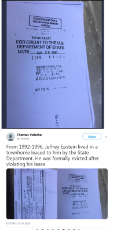
1564005394_2.jpg (240.4 KB, 885x1584, 510d1df346d550df812c686055387f4c3284e53d0295ae4ce7664b4ead4881dc.jpg)
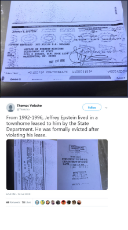
1564005394_3.png (356.3 KB, 861x822, 9e1894edf86be851bbf6484a704401a91f312a3adc8158292dee4f846d7e5fa1.png)
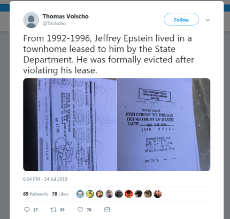
>>232471
>https://twitter.com/TVolscho
Jeffrey Epstein built fortune by 'blackmailing investors over sex parties,' says sociology professor writing a book about the financier
Thomas Volscho, a professor at the College of Staten Island, is writing a book on Epstein and has looked into how he made his fortune, which is a 'mystery'
https://www.dailymail.co.uk/news/article-7243829/Jeffrey-Epstein-blackmailed-investors-wouldnt-pay-says-sociology-professor.html
>https://twitter.com/TVolscho
Jeffrey Epstein built fortune by 'blackmailing investors over sex parties,' says sociology professor writing a book about the financier
Thomas Volscho, a professor at the College of Staten Island, is writing a book on Epstein and has looked into how he made his fortune, which is a 'mystery'
https://www.dailymail.co.uk/news/article-7243829/Jeffrey-Epstein-blackmailed-investors-wouldnt-pay-says-sociology-professor.html
>>232473
>Thomas Volscho, a professor at the College of Staten Island, is writing a book on Epstein and has looked into how he made his fortune, which is a 'mystery'
Well, a mystery perhaps to him, but not the IRS.
>Thomas Volscho, a professor at the College of Staten Island, is writing a book on Epstein and has looked into how he made his fortune, which is a 'mystery'
Well, a mystery perhaps to him, but not the IRS.
>Jeffrey Epstein Found Injured in NYC Jail Cell After Possible Suicide Attempt or Assault
https://archive.fo/BfVWW
and also
>Raniere Beaten by Mexicans: Out of Hospital and Headed to Isolation Unit
https://frankreport.com/2019/07/23/raniere-returns-from-hospital-headed-to-isolation-unit/
https://archive.fo/BfVWW
and also
>Raniere Beaten by Mexicans: Out of Hospital and Headed to Isolation Unit
https://frankreport.com/2019/07/23/raniere-returns-from-hospital-headed-to-isolation-unit/
1564036381.jpg (339.3 KB, 1080x1037, de4051eff480ee0e8282d4c0c0dbcfca8e1e9ff36661bd2da4c8f8362260d926.jpg)
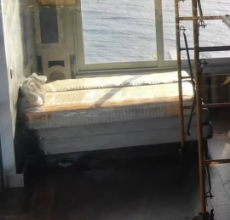
>>232525
>The inmate who investigators have talked to in Lower Manhattan facility has been identified as Nicholas Tartaglione, according to a source. Tartaglione is a former Orange County police officer who was arrested in December 2016 and accused of killing four men in an alleged cocaine distribution conspiracy, then burying their bodies in his yard in Otisville, according to court records.
Sounds precisely like a sort of inside man for the Deep State.
>The inmate who investigators have talked to in Lower Manhattan facility has been identified as Nicholas Tartaglione, according to a source. Tartaglione is a former Orange County police officer who was arrested in December 2016 and accused of killing four men in an alleged cocaine distribution conspiracy, then burying their bodies in his yard in Otisville, according to court records.
Sounds precisely like a sort of inside man for the Deep State.
>>232542
>No loose ends.
Given all the dirt he has on powerful people, and the damage he can inflict if he starts to sing, I don't think they will take risk of letting him live. I wonder if he will accidentally shoot himself while in prison just to statute an example and leave no doubt to others that if you talk or could be pressured to talk you die.
>No loose ends.
Given all the dirt he has on powerful people, and the damage he can inflict if he starts to sing, I don't think they will take risk of letting him live. I wonder if he will accidentally shoot himself while in prison just to statute an example and leave no doubt to others that if you talk or could be pressured to talk you die.
>>232546
No need to fake a suicide. The general population of most prisons HATES pedophiles. All that they need to do is allow him to get too close to prisoners who want him dead and fail to protect him.
No need to fake a suicide. The general population of most prisons HATES pedophiles. All that they need to do is allow him to get too close to prisoners who want him dead and fail to protect him.
>>232547
True. I'm just thinking how strong message they want to send to others. If Epstein "commits suicide" in his jail cell by "self inflicted shotgun wound" it would remind others to not even try to speak.
True. I'm just thinking how strong message they want to send to others. If Epstein "commits suicide" in his jail cell by "self inflicted shotgun wound" it would remind others to not even try to speak.
1564191796.png (445.6 KB, 601x594, 66506999_2354382748170212_6739965321458745344_n.png)

>Jeffrey Epstein’s cellmate — a former cop charged with quadruple murder — told authorities he came to the perverted multimillionaire’s rescue after he attempted to hang himself, alerting correction officers and possibly saving his life, a source told the Daily News Friday.
...
https://www.nydailynews.com/new-york/ny-epstein-life-behind-bars-20190726-ujdvknsmz5a4rbcgzfms6cqti4-story.html
...
https://www.nydailynews.com/new-york/ny-epstein-life-behind-bars-20190726-ujdvknsmz5a4rbcgzfms6cqti4-story.html
>>232788
>>232791
I hope they will be able to deny Epstein the easy way out and that we get to watch him decay in prison. But there is also a good chance he already have paid his way out and get to spend the rest of his life in similar luxury as he is used to, except that there will be no more kiddy diddling for him to do.
>>232791
I hope they will be able to deny Epstein the easy way out and that we get to watch him decay in prison. But there is also a good chance he already have paid his way out and get to spend the rest of his life in similar luxury as he is used to, except that there will be no more kiddy diddling for him to do.
>>232798
Which ever story is true it's hard to imagine he could be in a more broken state than he is now. And he isn't even convicted yet.
Which ever story is true it's hard to imagine he could be in a more broken state than he is now. And he isn't even convicted yet.
>Epstein Held in New York Version of Guantánamo
>Jeffrey Epstein was being housed in the “10 South” unit, commonly known as the “HOLE” which is a 24- hour lock-down where they also keep terrorists. It has been called America’s Gulag and the guantánamo hid in New York City nobody is allowed to know about. It’s where America violates human rights all the time but keeps as its dirty little secret. MCC 10 South is where the government keeps federal inmates, including alleged terrorists, to cut them off from the world with no regular access to visits or telephones. The treatment in 10 South is the worst a human being can endure and it will drive many humans to choose suicide to indefinite imprisonment under such conditions.
>Most suicides in MCC take place where Epstein is being held so much so that a psychiatrist visits usually once every other week or so to check on the inmates held in this torture chamber. Epstein’s cell-mate was Nicholas Tartaglione, who is a former Briarcliff Manor cop that faces the death penalty in four drug-related killings upstate. He claims he was wearing earbuds when investigators went to question him about the incident. There is no possible way that a cell-mate would not have known if the other guy tried to commit suicide.
>Naturally, the government response is that Epstein may have staged suicide to be moved to a different prison. That is absurd for MCC is a holding center for people pending trial, not a “prison” for sentenced inmates. Because Epstein is not found “guilty” he cannot go to a real prison. MCC has no prison yard. There is no grass or trees. You are inside a high rise building with no sun. The only other place he could be transferred to is Brooklyn’s MCC, which is no real difference.
>Inmates are often killed by others as a cover-up so the government can blame them but strangely they manage to get some sort of deal. My bet is that Tartaglione will NEVER face the death penalty. I know the conspiracy groups are already blaming Clinton. But Epstein probably goes way beyond just Hillary and Clinton and the new New York play is entitled (which rumor has it the Clinton’s had shut down). This may rise well beyond that so I do not believe that Epstein will ever see a trial.
https://www.armstrongeconomics.com/international-news/rule-of-law/epstein-held-in-new-york-version-of/
>Jeffrey Epstein was being housed in the “10 South” unit, commonly known as the “HOLE” which is a 24- hour lock-down where they also keep terrorists. It has been called America’s Gulag and the guantánamo hid in New York City nobody is allowed to know about. It’s where America violates human rights all the time but keeps as its dirty little secret. MCC 10 South is where the government keeps federal inmates, including alleged terrorists, to cut them off from the world with no regular access to visits or telephones. The treatment in 10 South is the worst a human being can endure and it will drive many humans to choose suicide to indefinite imprisonment under such conditions.
>Most suicides in MCC take place where Epstein is being held so much so that a psychiatrist visits usually once every other week or so to check on the inmates held in this torture chamber. Epstein’s cell-mate was Nicholas Tartaglione, who is a former Briarcliff Manor cop that faces the death penalty in four drug-related killings upstate. He claims he was wearing earbuds when investigators went to question him about the incident. There is no possible way that a cell-mate would not have known if the other guy tried to commit suicide.
>Naturally, the government response is that Epstein may have staged suicide to be moved to a different prison. That is absurd for MCC is a holding center for people pending trial, not a “prison” for sentenced inmates. Because Epstein is not found “guilty” he cannot go to a real prison. MCC has no prison yard. There is no grass or trees. You are inside a high rise building with no sun. The only other place he could be transferred to is Brooklyn’s MCC, which is no real difference.
>Inmates are often killed by others as a cover-up so the government can blame them but strangely they manage to get some sort of deal. My bet is that Tartaglione will NEVER face the death penalty. I know the conspiracy groups are already blaming Clinton. But Epstein probably goes way beyond just Hillary and Clinton and the new New York play is entitled (which rumor has it the Clinton’s had shut down). This may rise well beyond that so I do not believe that Epstein will ever see a trial.
https://www.armstrongeconomics.com/international-news/rule-of-law/epstein-held-in-new-york-version-of/
>>232921
>to cut them off from the world with no regular access to visits or telephones. The treatment in 10 South is the worst a human being can endure and it will drive many humans to choose suicide to indefinite imprisonment under such conditions.
So Epstein is basically held in custody with strict control of media and correspondence like most criminals are after their arrest (at least here in Norway).
>to cut them off from the world with no regular access to visits or telephones. The treatment in 10 South is the worst a human being can endure and it will drive many humans to choose suicide to indefinite imprisonment under such conditions.
So Epstein is basically held in custody with strict control of media and correspondence like most criminals are after their arrest (at least here in Norway).
>Epstein case: judge agrees to keep documents on 2008 plea deal secret
>Court grants prosecutors’ request amid concern that releasing materials could hinder investigation of financier’s associates
...
https://www.theguardian.com/us-news/2019/jul/27/jeffrey-epstein-2008-documents-secret
>Court grants prosecutors’ request amid concern that releasing materials could hinder investigation of financier’s associates
...
https://www.theguardian.com/us-news/2019/jul/27/jeffrey-epstein-2008-documents-secret
>>232927
I hope this isn't a sign that it will be kept secret, but that they actually are investigating the frequent flyers on the Lolita Express.
I hope this isn't a sign that it will be kept secret, but that they actually are investigating the frequent flyers on the Lolita Express.
>>232928
>'Charity founded by socialite who "procured underage girls for Jeffrey Epstein" is investigated by FBI'
https://www.dailymail.co.uk/news/article-7293797/Charity-founded-socialite-procured-underage-girls-Jeffrey-Epstein-investigated-FBI.html
>'Charity founded by socialite who "procured underage girls for Jeffrey Epstein" is investigated by FBI'
https://www.dailymail.co.uk/news/article-7293797/Charity-founded-socialite-procured-underage-girls-Jeffrey-Epstein-investigated-FBI.html
>>232929
I wonder if there will be an mass exodus of millionaires and billionaires to non-extradition tax havens in the time to come. They might hope for Trump to loose the election so they can say it is because of increase taxes they are moving, and not having to come up with a less plausible reason.
I wonder if there will be an mass exodus of millionaires and billionaires to non-extradition tax havens in the time to come. They might hope for Trump to loose the election so they can say it is because of increase taxes they are moving, and not having to come up with a less plausible reason.
>>232081
>I think we need to also add that they are young, stupid, and lack the capacity to fully comprehend where it is heading.
Of course they know, fast and easy cash is something no female can resist. It is the female's nature.
>I think we need to also add that they are young, stupid, and lack the capacity to fully comprehend where it is heading.
Of course they know, fast and easy cash is something no female can resist. It is the female's nature.
Source of >>233086
...
>Long before Jeffrey Epstein boasted of his billionaires-only client list—and long before his arrests for molesting underage girls in Florida and New York—the perverted financier was an eligible bachelor in the glossy pages of Cosmopolitan.
>In July 1980, Epstein was featured as the magazine’s “Bachelor of the Month,” a tiny section advertising successful single men across the country. At the time, the future sex-offender was a Bear Stearns trader and asked potential dates to write him at the investment bank's former headquarters in Lower Manhattan.
...
https://www.thedailybeast.com/when-jeffrey-epstein-was-cosmopolitan-bachelor-of-the-month?ref=home
...
>Long before Jeffrey Epstein boasted of his billionaires-only client list—and long before his arrests for molesting underage girls in Florida and New York—the perverted financier was an eligible bachelor in the glossy pages of Cosmopolitan.
>In July 1980, Epstein was featured as the magazine’s “Bachelor of the Month,” a tiny section advertising successful single men across the country. At the time, the future sex-offender was a Bear Stearns trader and asked potential dates to write him at the investment bank's former headquarters in Lower Manhattan.
...
https://www.thedailybeast.com/when-jeffrey-epstein-was-cosmopolitan-bachelor-of-the-month?ref=home
1564554801.mp4 (25.0 MB, Resolution:640x360 Length:00:07:51, Heres How Insanly Creepy Its Getting w Epsteins Bud Alan Dershowitz!.mp4) [play once] [loop]
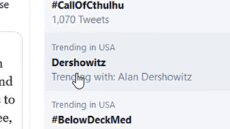
>>230372
>>230590
>>231558
Dershowitz wanting to change age-of-consent laws, AFTER he's accused of molesting minors in a high profile sex trafficking case.
https://www.bitchute.com/video/2sc_ejZKdvI/
>>230590
>>231558
Dershowitz wanting to change age-of-consent laws, AFTER he's accused of molesting minors in a high profile sex trafficking case.
https://www.bitchute.com/video/2sc_ejZKdvI/
>Exclusive: Jeffrey Epstein once spoke to scientists and others of a plan to seed the human race with his DNA by impregnating scores of women at his New Mexico ranch
https://twitter.com/nytimes/status/1156645612370223104
https://twitter.com/nytimes/status/1156645612370223104
>>233704
This unoriginal kike wanted to establish a baby farm using shiksas instead of jewesses. Nothing new here.
This unoriginal kike wanted to establish a baby farm using shiksas instead of jewesses. Nothing new here.
Are there cladestine drugging and hypnotising of some people before they go to court? Do they have memories wiped?
https://www.dailymail.co.uk/news/article-7306605/Dazed-Jeffrey-Epstein-shows-no-sign-injury-court-appearance-trial-set-June.html
https://www.dailymail.co.uk/news/article-7306605/Dazed-Jeffrey-Epstein-shows-no-sign-injury-court-appearance-trial-set-June.html
1564722984.mp4 (20.2 MB, Resolution:854x480 Length:00:05:23, The Jeffrey Epstein Meme.mp4) [play once] [loop]
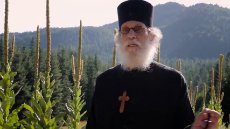
The Jeffrey Epstein Meme.
>Epstein Lawyers Ask for a Year to Review a Million Pages
https://www.bloomberg.com/news/articles/2019-07-31/jeffrey-epstein-s-lawyers-say-they-need-year-to-review-documents
https://www.bloomberg.com/news/articles/2019-07-31/jeffrey-epstein-s-lawyers-say-they-need-year-to-review-documents
>>233787
imagine the shock difference in (economic) freedom of having a private island, a jet plane, and billions of dollars when one is shifted to the economic freedom of a prison cell. Like man, that must hurt bad.
On top of that, the guy is now a national icon for this with political ties, its so easy to get people on the inside if you have connections, and knowing the criminal reputation of people like the Clintons, you can imagine the guy is on edge, sort of a fish out of water in his economic situation of freedom
plus they give people meds if they want them
imagine the shock difference in (economic) freedom of having a private island, a jet plane, and billions of dollars when one is shifted to the economic freedom of a prison cell. Like man, that must hurt bad.
On top of that, the guy is now a national icon for this with political ties, its so easy to get people on the inside if you have connections, and knowing the criminal reputation of people like the Clintons, you can imagine the guy is on edge, sort of a fish out of water in his economic situation of freedom
plus they give people meds if they want them
Ep court doco drops:
https://www.courthousenews.com/wp-content/uploads/2019/08/Giuffre-unseal.pdf
Quote so you know whats at the link pdf:
iTABLE OF CONTENTSPageI.PRELIMINARY STATEMENT.........................................................................................1II.UNDISPUTED FACTS.......................................................................................................4
A.It is an Undisputed Fact That Multiple Witnesses Deposed in This Case Have Testified That Defendant Operated as Convicted Pedophile Jeffrey Epstein’s Procurer of Underage Girls......................................................................................4
1.It is an undisputed fact that Joanna Sjoberg testified Defendant lured her from her school to have sex with Epstein under the guise of hiring her for a job answering phones....................................................................4
2.It is an undisputed fact that Tony Figueroa testified that Defendant would call him to bring over underage girls and that Defendant and Epstein would have threesomes with Ms. Giuffre.......................................6
3.It is an undisputed fact that Rinaldo Rizzo testified that Defendant took the passport of a 15-year-old Swedish girl and threatened her when she refused to have sex with Epstein.................................................8
4.It is an undisputed fact that Lyn Miller testified that she believed Defendant became Ms. Giuffre’s “new mama”...........................................9
5.It is an undisputed Fact that Detective Joseph Recarey testified that he sought to investigate Defendant in relation to his investigation of Jeffrey Epstein.............................................................................................9
6.It is an undisputed fact that Pilot David Rodgers testified that he flew Defendant and Ms. Giuffre at least 23 times on Epstein’s jet, the “Lolita Express” and that “GM” on the flight logs Stands for Ghislaine Maxwell.....................................................................................................10
7.It is an undisputed fact thatSarah Kellen, Nadia Marcinkova, and Jeffrey Epstein invoked the fifth amendment when asked about Defendant trafficking girls for Jeffery Epstein..........................................10
8.It is an undisputed fact that Juan Alessi testified that Defendant was one of the people who procured some of the over 100 girls he witnessed visit Epstein, and that he had to clean Defendant’s sex toys....11
9.It is an undisputed fact that Defendant is unable to garner a single witness throughout discovery who can testify that she did not act as the procurer ofunderage girls and young women for Jeffrey Epstein............12
---
Dig and share. Maybe this is what is being covered up.
https://www.courthousenews.com/wp-content/uploads/2019/08/Giuffre-unseal.pdf
Quote so you know whats at the link pdf:
iTABLE OF CONTENTSPageI.PRELIMINARY STATEMENT.........................................................................................1II.UNDISPUTED FACTS.......................................................................................................4
A.It is an Undisputed Fact That Multiple Witnesses Deposed in This Case Have Testified That Defendant Operated as Convicted Pedophile Jeffrey Epstein’s Procurer of Underage Girls......................................................................................4
1.It is an undisputed fact that Joanna Sjoberg testified Defendant lured her from her school to have sex with Epstein under the guise of hiring her for a job answering phones....................................................................4
2.It is an undisputed fact that Tony Figueroa testified that Defendant would call him to bring over underage girls and that Defendant and Epstein would have threesomes with Ms. Giuffre.......................................6
3.It is an undisputed fact that Rinaldo Rizzo testified that Defendant took the passport of a 15-year-old Swedish girl and threatened her when she refused to have sex with Epstein.................................................8
4.It is an undisputed fact that Lyn Miller testified that she believed Defendant became Ms. Giuffre’s “new mama”...........................................9
5.It is an undisputed Fact that Detective Joseph Recarey testified that he sought to investigate Defendant in relation to his investigation of Jeffrey Epstein.............................................................................................9
6.It is an undisputed fact that Pilot David Rodgers testified that he flew Defendant and Ms. Giuffre at least 23 times on Epstein’s jet, the “Lolita Express” and that “GM” on the flight logs Stands for Ghislaine Maxwell.....................................................................................................10
7.It is an undisputed fact thatSarah Kellen, Nadia Marcinkova, and Jeffrey Epstein invoked the fifth amendment when asked about Defendant trafficking girls for Jeffery Epstein..........................................10
8.It is an undisputed fact that Juan Alessi testified that Defendant was one of the people who procured some of the over 100 girls he witnessed visit Epstein, and that he had to clean Defendant’s sex toys....11
9.It is an undisputed fact that Defendant is unable to garner a single witness throughout discovery who can testify that she did not act as the procurer ofunderage girls and young women for Jeffrey Epstein............12
---
Dig and share. Maybe this is what is being covered up.
>Court documents unsealed Friday revealed thousands of documents concerning Jeffrey Epstein's accuser Virginia Roberts Giuffre and her defamation suit against his ex-girlfriend, associate, and alleged "madam," Ghislaine Maxwell.
>A 2015 case between Giuffre and Maxwell occurred after Giuffre accused Epstein of sex-trafficking her, with Maxwell participating, after which Maxwell called Giuffre a liar.
>Giuffre then sued Maxwell for defamation, and a total of 167 documents with thousands of pages combined were filed under seal.
>Maxwell motioned for a summary judgment in January 2017 and, two months later, the district court in New York denied her motion with a largely redacted 76-page opinion.
>Giuffre v. Maxwell was settled in May 2017.
> The documents include a photo of a 2005 Amazon receipt for an order Epstein placed for books about sadomasochism and how to use sex slaves, with the titles "SM 101: A Realistic Introduction," "SlaveCraft: Roadmaps for Erotic Servitude," and "Training with Miss Abernathy: A Workbook for Erotic Slaves and Their Owners."
> In a transcript of a 2013 interview with the FBI contained in the documents, Giuffre describes how Epstein pampered her as an underage girl to keep her by his side, including giving her hundreds of dollars in cash, taking her on luxury vacations, and paying for shopping sprees, starting when she was 15-years-old.
> Newly unsealed flight logs from a private jet belonging to Epstein list President Donald Trump on a January 1997 flight from Palm Beach, Florida, to Newark, New Jersey, alongside billionaire couple Glenn and Eva Dubin, all of whom have come under scrutiny following Epstein's July arrest.
https://amp.businessinsider.com/epstein-giuffre-v-maxwell-unsealed-thousands-documents-defamation-2019-8
>A 2015 case between Giuffre and Maxwell occurred after Giuffre accused Epstein of sex-trafficking her, with Maxwell participating, after which Maxwell called Giuffre a liar.
>Giuffre then sued Maxwell for defamation, and a total of 167 documents with thousands of pages combined were filed under seal.
>Maxwell motioned for a summary judgment in January 2017 and, two months later, the district court in New York denied her motion with a largely redacted 76-page opinion.
>Giuffre v. Maxwell was settled in May 2017.
> The documents include a photo of a 2005 Amazon receipt for an order Epstein placed for books about sadomasochism and how to use sex slaves, with the titles "SM 101: A Realistic Introduction," "SlaveCraft: Roadmaps for Erotic Servitude," and "Training with Miss Abernathy: A Workbook for Erotic Slaves and Their Owners."
> In a transcript of a 2013 interview with the FBI contained in the documents, Giuffre describes how Epstein pampered her as an underage girl to keep her by his side, including giving her hundreds of dollars in cash, taking her on luxury vacations, and paying for shopping sprees, starting when she was 15-years-old.
> Newly unsealed flight logs from a private jet belonging to Epstein list President Donald Trump on a January 1997 flight from Palm Beach, Florida, to Newark, New Jersey, alongside billionaire couple Glenn and Eva Dubin, all of whom have come under scrutiny following Epstein's July arrest.
https://amp.businessinsider.com/epstein-giuffre-v-maxwell-unsealed-thousands-documents-defamation-2019-8
>Epstein Documents Hit; Accuser Says Trump 'Didn't Partake In Any Sex With Any Of Us'
https://www.zerohedge.com/news/2019-08-09/epstein-document-dump-hits-accuser-says-trump-didnt-partake-any-sex-any-us
Trump attackers BTFO again.
https://www.zerohedge.com/news/2019-08-09/epstein-document-dump-hits-accuser-says-trump-didnt-partake-any-sex-any-us
Trump attackers BTFO again.
>Alleged assault victims of Jeffrey Epstein expected to speak at 'historic' hearing
>Multiple alleged victims of the late financier and convicted sex offender Jeffery Epstein are expected to make statements at a federal court hearing in Manhattan on Tuesday morning, sources with knowledge of the matter told ABC News.
>The hearing was set by U.S. District Court Judge Richard Berman to hear one last time from the government and Epstein’s lawyers before the criminal case is officially closed following the multimillionaire's suicide death earlier this month.
http://archive.is/zL3Lb
>Multiple alleged victims of the late financier and convicted sex offender Jeffery Epstein are expected to make statements at a federal court hearing in Manhattan on Tuesday morning, sources with knowledge of the matter told ABC News.
>The hearing was set by U.S. District Court Judge Richard Berman to hear one last time from the government and Epstein’s lawyers before the criminal case is officially closed following the multimillionaire's suicide death earlier this month.
http://archive.is/zL3Lb
Claim: The Zorro Ranch is where Epstein's breeding plan was to take place.
https://www.youtube.com/embed/B3zf13gpry0 (TruNews)
From: https://robinwestenra.blogspot.com/2019/08/digging-into-jeffrey-epstein-case.html which has a copy of the now missing https://www.trunews.com/stream/peek-inside-epstein-s-ranch
https://www.youtube.com/embed/B3zf13gpry0 (TruNews)
From: https://robinwestenra.blogspot.com/2019/08/digging-into-jeffrey-epstein-case.html which has a copy of the now missing https://www.trunews.com/stream/peek-inside-epstein-s-ranch
Accused Pedophile Woody Allen Seen Popping Out Of Convicted Pedophile Jeffrey Epstein's Mansion
Mon, 08/26/2019 - 14:35
https://www.zerohedge.com/news/2019-08-26/accused-pedophile-woody-allen-seen-popping-out-convicted-pedophile-jeffrey-epsteins
https://archive.fo/6R9yP
The list of people caught associating with Jeffrey Epstein after he did time for pedophilia keeps growing. From Bill Gates to Prince Andrew to Ehud Barak - the list of famous names associated with Epstein now includes filmmaker and accused pedophile Woody Allen, who was seen exiting the financier's Manhattan townhouse after a December, 2010 party in honor of another accused pedophile, Prince Andrew.
Allen and his wife, Soon-Yi Previn (who ex-wife Mia Farrow adopted when she was eight years old) were seen leaving the soire, however the two were spotted leaving the mansion on more than one occasion during Prince Andrew's stay, according to the Daily Mail.
...
As the Mail reports: "The December 2 dinner was held in the mansion’s second-floor dining room. TV anchor Katie Couric, once the highest-paid female presenter in the US, sat alongside comedian Chelsea Handler, a close friend of Gwyneth Paltrow and Jennifer Aniston. Also there was George Stephanopoulos, a former White House communications director under President Bill Clinton turned £15 million-a-year ABC News host."
So we can add the above names to the list of people with no problem hanging out with a pedophile.
...
Mon, 08/26/2019 - 14:35
https://www.zerohedge.com/news/2019-08-26/accused-pedophile-woody-allen-seen-popping-out-convicted-pedophile-jeffrey-epsteins
https://archive.fo/6R9yP
The list of people caught associating with Jeffrey Epstein after he did time for pedophilia keeps growing. From Bill Gates to Prince Andrew to Ehud Barak - the list of famous names associated with Epstein now includes filmmaker and accused pedophile Woody Allen, who was seen exiting the financier's Manhattan townhouse after a December, 2010 party in honor of another accused pedophile, Prince Andrew.
Allen and his wife, Soon-Yi Previn (who ex-wife Mia Farrow adopted when she was eight years old) were seen leaving the soire, however the two were spotted leaving the mansion on more than one occasion during Prince Andrew's stay, according to the Daily Mail.
...
As the Mail reports: "The December 2 dinner was held in the mansion’s second-floor dining room. TV anchor Katie Couric, once the highest-paid female presenter in the US, sat alongside comedian Chelsea Handler, a close friend of Gwyneth Paltrow and Jennifer Aniston. Also there was George Stephanopoulos, a former White House communications director under President Bill Clinton turned £15 million-a-year ABC News host."
So we can add the above names to the list of people with no problem hanging out with a pedophile.
...
https://www.dailymail.co.uk/news/article-7393521/Prince-Andrew-willing-talk-FBI-requested-Palace-sources-say.html
Jeffrey Epstein storm: Prince Andrew 'now willing to talk to the FBI if requested' Palace sources say as flight logs suggest Duke met disgraced millionaire a year EARLIER than he admitted in letter
Prince Andrew will co-operate with police over the Jeffrey Epstein case if asked
Metropolitan Police decided not to investigate claims first made in 2015 against the Duke of York
Alleged Epstein victims have urged Duke to help investigators in lawsuit
In recent press statement he tried to downplay his friendship with Epstein
The pair first met in 1999, and Prince Andrew would see Epstein 'one or two times a year'
Jeffrey Epstein storm: Prince Andrew 'now willing to talk to the FBI if requested' Palace sources say as flight logs suggest Duke met disgraced millionaire a year EARLIER than he admitted in letter
Prince Andrew will co-operate with police over the Jeffrey Epstein case if asked
Metropolitan Police decided not to investigate claims first made in 2015 against the Duke of York
Alleged Epstein victims have urged Duke to help investigators in lawsuit
In recent press statement he tried to downplay his friendship with Epstein
The pair first met in 1999, and Prince Andrew would see Epstein 'one or two times a year'
>Vanity Fair Interviewed Epstein’s Accusers but Never Published Their Report After Epstein Visited Offices… UPDATE: Severed Cat Head in the Yard
https://www.thegatewaypundit.com/2019/08/vanity-fair-interviewed-epsteins-accusers-but-never-published-their-reports-after-epstein-visited-offices/
https://www.thegatewaypundit.com/2019/08/vanity-fair-interviewed-epsteins-accusers-but-never-published-their-reports-after-epstein-visited-offices/
216 replies | 92 files | 52 UUIDs | Archived

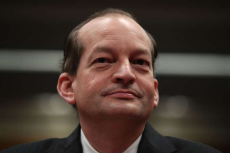



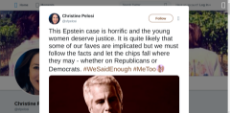
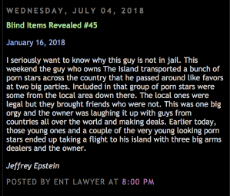
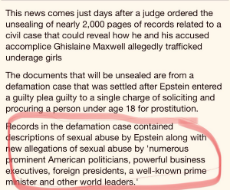
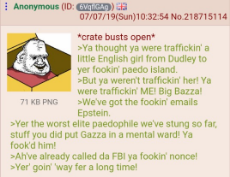
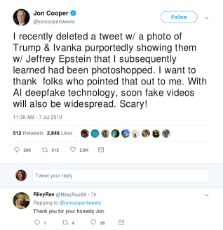




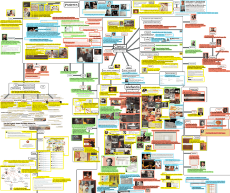
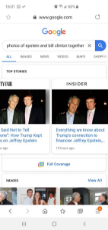
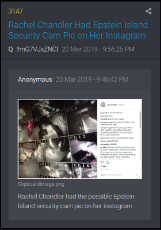
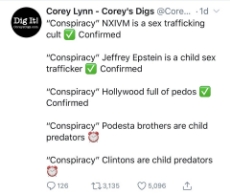
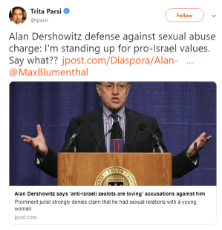
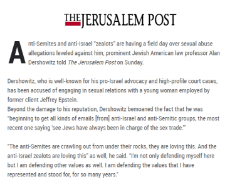
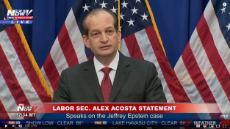

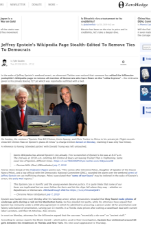


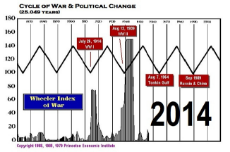
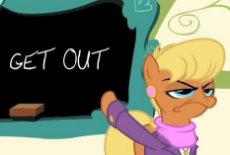



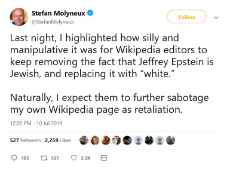

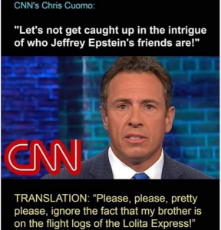

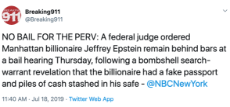
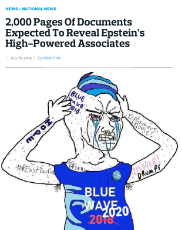

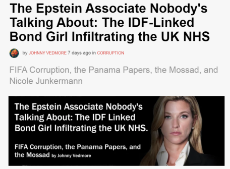





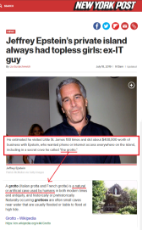
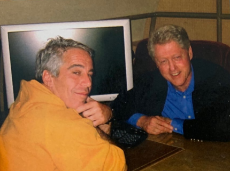
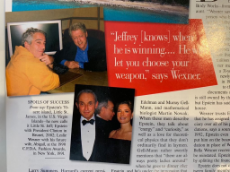
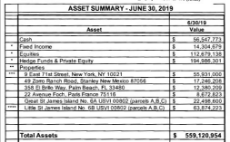


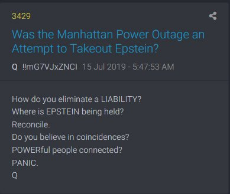
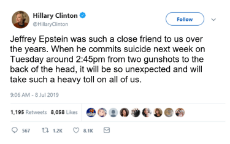

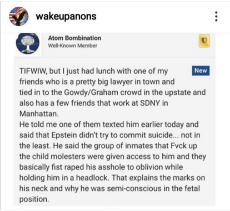


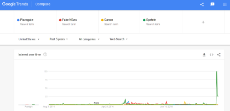

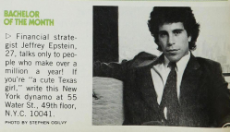

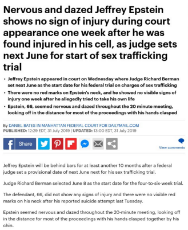
 Ex: Type :littlepip: to add Littlepip
Ex: Type :littlepip: to add Littlepip  Ex: Type :eqg-rarity: to add EqG Rarity
Ex: Type :eqg-rarity: to add EqG Rarity 